Viewing

Samuel Dirksz van Hoogstraten: View of a Corridor (1662)
"Let the record show that on this last day of summer, I started leaning in again."
The Muse and I live near the top of a minor mountain in a region filled with more significant ones. Ours hardly merits mentioning, but still our elevation often leaves us feeling as if we're floating above much of the rest of creation, like Greek gods or something. We nevertheless choose to live humbly here, something I believe we'd do whatever our circumstance, and we've actually lived even more humbly before, accepting waning as another part of an apparently never-ending cycle of increase and decrease, like respiration. 'As I live and breathe' translates into 'sometimes we give and sometimes we receive', with net increase or decrease more a matter of accounting periods than of any superiority or shortcoming. We do our work, grateful for having it, and too often temporarily forget the sublime beneficence of both possessing it as well as often feeling utterly possessed by it, for it fails to consume us, but seems instead insistently intent upon continually enriching us, even when it makes us no money. Living without purpose could only be worse for everybody.
That said, we're both feeling bled dry here on this final partial day of summer.
Dire
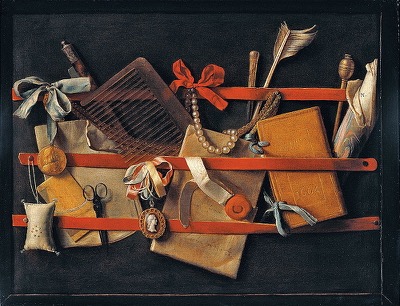
Samuel Dirksz van Hoogstraten: Tromp-l'oeil still life, 1664
"What strange lives we lead."
Our lives seem anything, everything but still. Even under This Damned Pandemic forcing us to march in place, we continue marching in what we firmly believe to be a forward trajectory, making progress, as the old saying insists, through Dire circumstances. I daily subject myself to a fresh edition of The Times, lest I fall uninformed regarding the form of the latest insults. I scroll my newsfeeds, continuously on the lookout for whatever must be coming next. I know for certain that something's stalking me, stalking us, because it seems, when I take a quiet moment to reflect, that 'twas always thus. Even back in what I now nostalgically recall as simpler times, complex threats continually surrounded me. My immune system's always been on high alert and trending ever higher, it seems, and were it not for my continuously-sounding early alert systems, I might well have already succumbed to one thing or another, some humiliation or bother. The fresh threats seem to invent ways to bushwhack me. Well, not exactly me, precisely, but us excluding me personally, for while we continually feel threatened, only a few of us ever actually fall prey, and it seems as though it's a different collection every day. Our society seems increasingly comprised of entropy spiraling ever more chaotically.
Some headlines chase me away, offering information I cannot quite afford to know.
BegendingsAgain
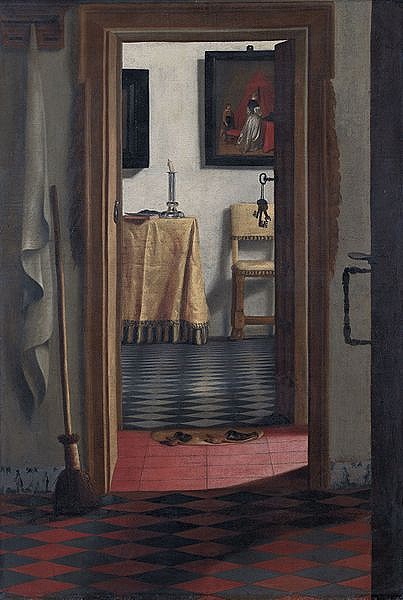
Samuel van Hoogstraten: View of an Interior, or The Slippers (Between 1654 and 1662)
"I clutch my innate cowardliness along with my pearls and move into."
I consider myself to be a change chicken, especially whenever encountering some inevitable. I could offer a master class in the fine art of denial. My feet naturally drag, providing a superpower resistance few very deeply appreciate. I can defend any late status quo state until long after any foreign element's completely overtaken it. I sometimes seem to be living in the past, still taking my cues from some long ago code of comportment. I live conservatively—not politically conservatively, for that philosophy always seemed far too radical for me—but intellectually conservatively, and also culturally. I rightfully consider most improvements to be degradations and most new beginnings to be primarily shrouded in endings. My glass is neither half empty nor half full, but still overflowing with potential. I'm the one most likely to order another one just like the one before.
I have been inhabiting the NowHere for an entire quarter now, or almost.
DateNight

Jan Miense Molenaer: The Denial of Saint Peter (1636)
[Molenaer depicted biblical stories in his own time and surroundings,
such as representing this scene from Peter's Gospel set in a Dutch Tavern.]
" … settling in with The Maximum Cat to dream about different days …"
Denver's not so much a food desert as a food prairie. Restaurants tend toward the predictable and steady, and seem few and far between. Little mystery lurks within any of them. Reservations, not usually necessary, unless, of course, you really want to get in at a specific time without waiting. Noise, like an incessant prairie wind, seems built in, and any visit tends toward the buffeting. Our damned pandemic has slowed the usual progression of people in and out, with most preferring an outside table, but even then, overcrowding seems a prominent feature of those few more choice options still open, especially those not featuring a drive-in window. The Muse and I have simply foregone any kind of eating out other than the very occasional take-out pizza, a prominent feature of the region's flat restaurant topography, anyway. But last Friday night, we really needed to get the heck out of our same old place after months of in-house suppers, crafted by our very own hands and inspired by flattening imaginations in precisely the same space. We behaved like the cats, screaming to be let out but with no destination imagined other than Not Here.
With no specific place in mind, not exactly the recipe for certain satisfaction, though back in the day, we could usually happen upon some semblance of a satisfactory place.
Impendings

Sir Peter Paul Rubens The Reconciliation of Jacob and Esau About 1625 - 1628
"I left only NowHeres behind."
Summer has been eroding since early July, wasting away in place. The Dog Days came and went, replaced by a succession of cat days, warm enough that the cats preferred to stay out unsupervised all night and started turning feral again. Max, The Maximum Cat, disappeared for two successive nights before suddenly appearing without an explanation, hungry. I, of apparently little faith, had already started imagining how I might cope with such a loss, here in this ass end of a sweet season, with so many competing Impendings already scheduled. The end of summer enters with stealth exceeding even that of the littlest cat's feet. It leaves no footprints at all and manages to surprise no matter how closely I watch my clocks and calendars. Perhaps especially this year, where so much has managed to maintain so much sameness backdropped by so danged much simply staying home. The Muse and I have been aching for a road trip, but circumstances or entropy have so far successfully stymied every attempt. Big change is coming, though. I know this because I feel unusually blind to the Impendings.
The first day of fall has been scheduled to appear on a Tuesday this year, slipped into midweek as if to discourage any leading or trailing long weekend celebration.
-finity
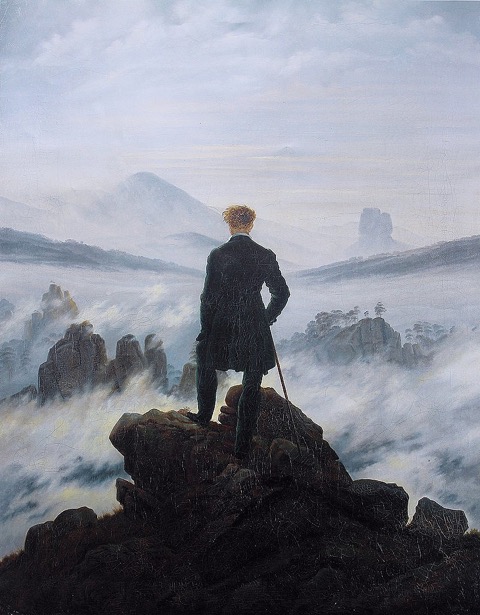
Wanderer above the Sea of Fog by Caspar David Friedrich (1818)
" … hope apparently actually does spring eternal…"
I have never considered myself an atheist, but then, I wouldn't call myself anti-theist, either. I believe in plenty and can recognize the utility embodied in the whole mythology, liturgy and all. I was raised attending a mid-century conservative Christian denomination, demons and all, and learned early of which I was better off not speaking about at all. I could not quite muster up even a half-decent belief in an old testament God, the one that looks like Moses' scowling uncle wearing a swaddling suit of so-called clothes reminiscent of nothing more than a onesie diaper ensemble with sandals; thank God, no socks. Always the sandals. The relationships between God as father and Jesus as the son of God and me as the apparent son of a mild-mannered postal worker and his I Love Lucy wife were about as clear as my father's family tree, swelling with halves and steps and even more baffling progeny. The idea of lord, let alone as savior, escaped me, and not just because I didn't believe, but because I simply could not, since I had not been raised in feudal times, understand the meaning of the terms. Still, I never really felt as if I was entirely on my own, for I always possessed an inner hopefulness, even in my most discouraging times.
I believe that hopefulness might represent what some more devout and comprehending mean when they speak of big 'G' God.
Stewing

A group of peasants sharing a simple meal of bread and drink;
Livre du roi Modus et de la reine Ratio, 14th century.
"My country used to be …"
They are a proud people, overly so. They expend their energies defending themselves, for they seem to attract enemies, foreign as well as domestic, and they insist that these enemies primarily target their 'Way of Life,' which they seem to hold as sacred without ever very finely defining what it entails other than to declare it containing inalienable rights, not necessarily privileges, responsibilities, or obligations, and 'traditional values.' They seem to firmly believe that owning a semi-automatic rifle and a handgun will protect them from tyranny, if not necessarily from each other. They insist that registering or licensing those weapons amounts to the tyranny from which those weapons were supposed to protect them. They distrust governments, which they firmly believe to be the primary author of the tyranny they oppose. They proudly proclaim that they refuse to expose themselves to mainstream media, which they believe engages in an ongoing conspiracy to misrepresent what's actually going on. They believe themselves to be authentic representatives of The People, The REAL People, not those hangers-on and Johnny-come-lately folks diluting the gene pool. They receive their information almost exclusively via gossip and rumor, and once they get an idea in their heads, they blithely deflect any conflicting information. Point them at a fact checker and they will proclaim, without evidence, that fact checkers have been proven unreliable. They live within an echo chamber.
They seem a stupid people but believe themselves cleverer, more insightful, wiser.
PinchOfSalt

Antonio del Pollaiolo: Battle of the Naked/Nudes, 1470
" … just when we really needed to be tipped over again."
I was blessed with little taste for salt. My lead palate cannot discern whether a dish needs salt before serving, so The Muse performs that service in the event that we have company for supper and this detail even matters. The Muse keeps the salt cellar handy at table to make up whatever deficit I deliver for dinner. I try, as the cookbooks show, to let salt start to breakdown proteins before cooking, but I work by direction rather than by taste or instinct, because I possess no salt sense. I'm aware that a man of my advancing age should limit my salt intake, but I find no reason to monitor it since I'm most likely to just forget about it altogether. I take it, though, that some find an extra pinch of salt necessary, though I have resigned myself to never understanding why. The Muse also possesses a superior taste for wine and can sense the presence of corking I cannot perceive. I sometimes doubt whether we're the same species, as divergent as our sensibilities seem.
Last week, The Muse leaned over and salted the GrandOtter's already plated supper after suddenly realizing that she'd forgotten to salt it in preparation.
Patruns
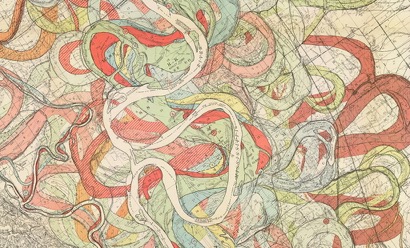
US Army Corps of Engineers geologist and cartographer Harold Fisk: Meander Map of the Mississippi River (1944)
"Give the Patrun a silly name and see where that leads."
Us consultants types often speak about organizational patterns of behavior, just as if an organization could behave. Often (as in always), a consultant type like me will stroll around a workplace simply observing. We might linger to chat with folks as we meander around, but any observer observing this observer might readily conclude that we're aimlessly wandering. We're actually aimlessly collecting clues to what the people working within this place do when they aren't aware of doing much of anything at all. The consultant was invited in, usually under false initial pretenses, because someone's experiencing a difficulty. Successive improvements have typically failed to completely reverse disappointing results, so the consultant's engaged in a late-stage attempt to finally get a handle on it (or resolution's described in one of an infinite array of hackneyed non-descriptive phrases, each of which essentially screams, "We have no clue what to do.) Neither do the consultants, at least not at first. A walk-about might provide a few clues, though, as certain patterns might come into sharper focus. Later, sitting with the client, the consultant will engage in another "Did you notice?" conversation, where some scales might start falling from over the client's eyes.
Though organizations, not being people, are incapable of behaving, certain patterns of engagement or outcome strongly suggest the presence of some underlying behaviors.
MisFunction
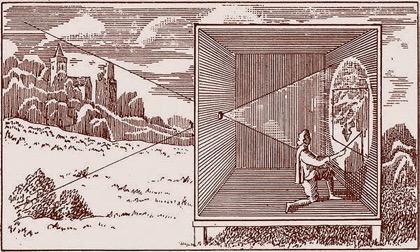
Engraving of a "portable" camera obscura in Athanasius Kircher's Ars Magna Lucis Et Umbrae (1645)
"Camera obscura (plural camerae obscurae or camera obscuras, from Latin camera obscūra, “dark chamber”), also referred to as pinhole image, is the natural optical phenomenon that occurs when an image of a scene at the other side of a screen (or, for instance, a wall) is projected through a small hole in that screen as a reversed and inverted image (left to right and upside down) on a surface opposite to the opening." Wikipedia
"Who's to say?"
Historians have recently concluded that seventeenth century Dutch painter Johannes Vermeer sort of cheated when he painted. Rather than merely observing his subjects, they speculate that he most probably employed a Camera Obscura which projected a full color image upside down on his canvas, thereby presenting a paint-by-number sort of template for him to simply fill in with color. This revelation suggests that he might have been more draftsman than artist, though his shortcut did nothing to infringe upon the sheer beauty of his work, which capture light in truly remarkable ways. But every art has its supposed-to-bes, it's hallowed, gentrified traditions, and mere photographic replication was never acknowledged as the point of either art or artistry. A master artist was supposed to possess a certain transcendent magical sense allowing production without resorting to what purists might consider cheap mechanical tricks. Yet what is the eye but a camera obscura, with the brain righting and coloring in inverted images? We see as we do due to a considerably more complex mechanism than any simple hole in a wall, and it's a genuine wonder any of us could make any sense of anything we ever saw, let alone, agree upon proportion, color, or placement.
MisFunction seems common in all sensory processing: vision, hearing, you name it.
TheRhodeIsland
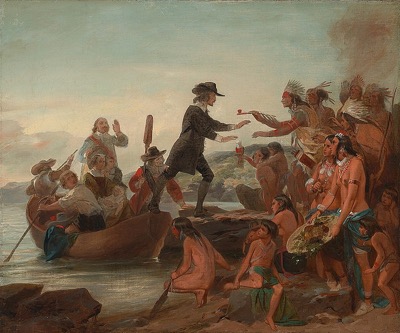
Alonzo Chappel: The Landing of Roger Williams in 1636 (1857)
"As tiny as that measure might seem, it's far too large to calculate any human affect …"
The standard calibration for natural disasters in the United States has long been TheRhodeIsland. Whether measuring hurricane or hail damage, government agencies as well as our print and broadcast media exclusively employ TheRhodeIsland as the universal unit of measure of size. True devastation rarely affects less than a single Rhode Island-sized area, and seems to often spread into dozens, occasionally scores. To clarify, TheRhodeIsland represents an area equivalent to the square mileage encompassed by our former colony and tiniest state, which roughly equals the size of a typical ex-urban McMansion estate, or, one Ponderosa, that fictional ranch featured in the sixties western television series, though both The McMansion and The Ponderosa feature far less distinct boundaries than TheRhodeIsland. In spite of this state enjoying the representation of two US Senators, it features fewer bathrooms than the typical McMansion. Fun Fact: It was also the birthplace of the most radical concept in governance ever to visit this continent, or, indeed, the world: Tolerance, a practice now long fallen into regrettable disuse.
Oregon ignites, and the resulting wildfire consumes several Rhode Islands overnight.
Revelations
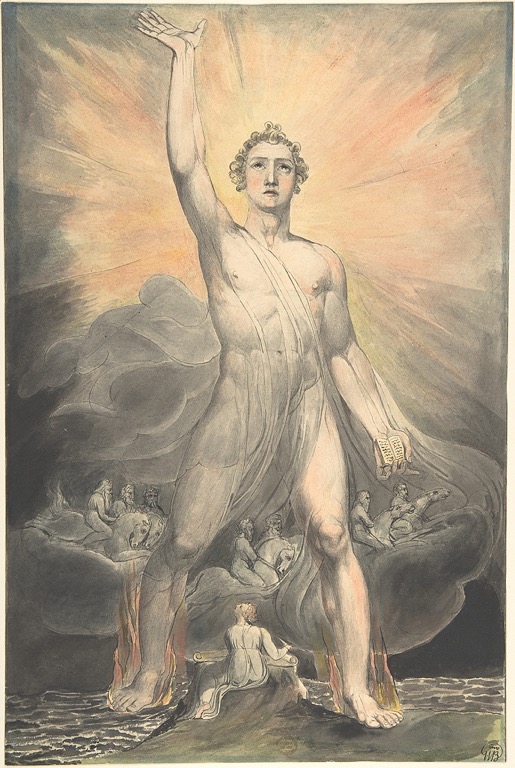
William Blake: Angel of the Revelation, ca. 1803–5
"I'm continuously moved to reflect just how unlike expectations Revelations always seem."
I seem to be living through a time where another shoe's always just waiting to drop, plots infinitely thickening, where every blessed thing I think I understand today might just be turned on its head tomorrow. I cannot honesty testify that my experience was ever different from this before, for I remember, like you remember, strings of surprising Revelations accompanying me from my earliest days, but it seems, reflecting, that the velocity just might have been steadily, subtly increasing over time, combining to produce a now dizzying result. Every damned thing seems swathed in speculation, with little probability that I'll readily recognize the upcoming outcome, which seems very likely to spawn just another interim and not any final resolution. We say that things are "up in the air," but this air seems thin and smoky, not necessarily fresh or health-giving, but sometimes more bordering upon the absolutely smothering. It probably doesn't help that we're living with a presidency produced like one of those shoddy "reality" television series, where each commercial break (and there suddenly seems to be endlessly infinite breaks for commercials) follows a fresh take on Keep-Away, almost revealing, but then, once again reporting that we'll just have to wait. They promise a brief break, but each invariably takes longer than any average attention span. I've lost focus by the time the program resumes, and the promised revelation usually turns out to be another come-on, prolonging what becomes deeply dissatisfying enough to leave me wondering after the higher purpose of my existence; hardly satisfying entertainment. I've been losing my desire to even turn on the damned television or read the Times to discover the latest "Revelations.".
The relationship between Revelations and resolutions seems disrupted right now, and this situation seems to insist upon me adopting some different expectations.
Burning

Camille Corot: The Burning of Sodom (formerly "The Destruction of Sodom"),1843 and 1857
" … one pair of boots I'm sure grateful I remembered to grab before I left."
Around the time I first moved to Portland in the mid-seventies, the Feds changed their policy regarding their Northwest forest land. They'd previously subsidized a vast rural economy. Cut-rate logging leases encouraged an extractive industry that funded schools, roads, and other government services along with high-paying rural jobs. The locals complained that the damned EPA regulations suddenly protecting small owls and tinier fish caused it, the downfall of entire regions. People were understandably pissed when forced to move into cities or settle into lives as the suddenly working poor. They remembered their grandparents' stories about being poor back before The Dust Bowl had brought them here to the promised land. It had been every bit as good as promised to them up until then. Proud traditions were summarily disrupted and the victims usually blamed for their shifting fortunes. They'd age into a bitter conservatism still remembering when and their children would join a local underground militia, fomenting for similar to their own disruption at the top. The same sorry game played out on the other side of the country in the rust belt, as over the following third of a century, jobs evaporated with little recourse. We'd entered a deliberately disruptive time. Now, of course, Oregon's known as The Silicon Forest, though few ex-loggers work in high tech. Many remain up to their necks in debt from barely surviving and still live in once-thriving but ever-shrinking small towns that hardly seem like towns anymore; slightly wider spots along the road over to Bend or K-Falls.
The surrounding woodland was always good to these people, a genuine wonderland of scenery, recreational opportunity, and game.
Issues

Portrait of Martin Luther by Hans Balding Grien, 1521 Woodcut
"We dare not squabble over Issues …"
I take issue with Issues, which seem to have become the primary medium for political discourse, such as it's become. Reporters ask where a candidate stands, offering hardly a thin, brittle branch for any candidate to stand upon. They speak in a curious shorthand where keywords stand in for actual questions. "Where do you stand on abortion?" one might ask, a guaranteed double-binding, damning sort of non-question almost certain to elicit a meaningless response. Abortion has become a poisonous word. Even a sentence fragment containing it seems certain to taint anyone associated with it, for it's become the primary marker of ginned up moral outrage. Nobody ever asks where a candidate stands on preserving the life of a mother, for the unborn seem to have become citizens with rights exceeding any of those enjoyed by the previously born, even though they have universally failed to qualify as citizens at all. Their primary occupation seems to have become sparking outrage, which seems quite the clever accomplishment for anyone having not yet come into this world, let alone of age.
Issues represent the gotcha game of our time.
SolstusInterruptus
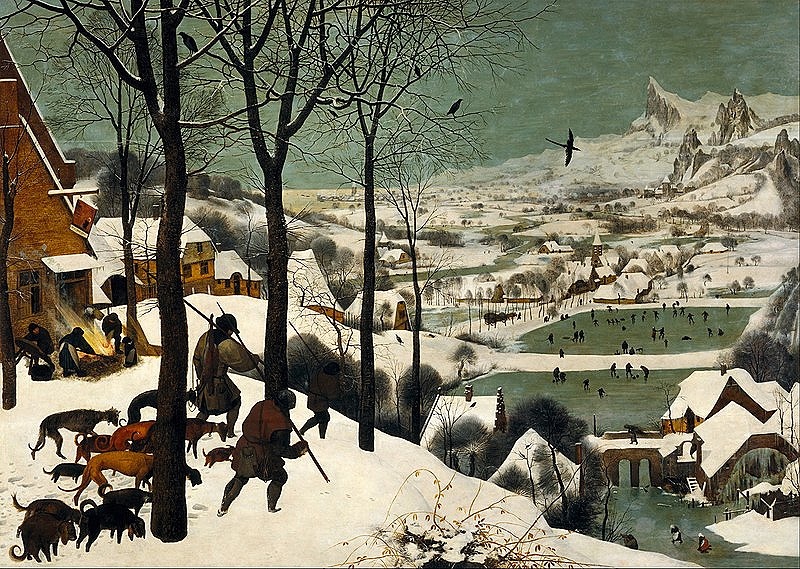
Pieter Brueghel the Elder, The Hunters in the Snow, 1565
" … I suspect it's only napping."
As if mistaking an afternoon for the wee hours, our summer pulled a reversal overnight. Eighty-five and terribly smoky just yesterday, I woke to snow covered ground. Roads remain bare, since we were frying eggs on the asphalt yesterday and it holds heat like a fire brick, but the trees, none even starting to turn autumn colors yet, suddenly inhabit a snow globe. A very small hummingbird visits the remnants of the hummingbird feeder's contents, still liquid, thank heavens. I'd thought to take it down yesterday afternoon as I prepped for this storm. I almost regret that I live in a time when I can know what the morrow will likely beget, for I spent the few days leading into today dreading summer's interruption. I dutifully carried almost every planter and pot to a tarp-covered basement floor, and even blew out the drip irrigation system as if it was suddenly November in early September. A whole season of sitting on the deck surrounded by sweet scented blossoms, undone but not forgotten in a single afternoon. The cats must have thought me crazy, uprooting our outside home on such a hot and smoky afternoon. My back complained, too, after the lifting was through and I was sipping a cold one and surveying the damage I'd done on the rumor of winter.
I remembered wrong when I recalled previous early snows, for twenty years have passed since the last September snowfall here.
Synchroenicheatea
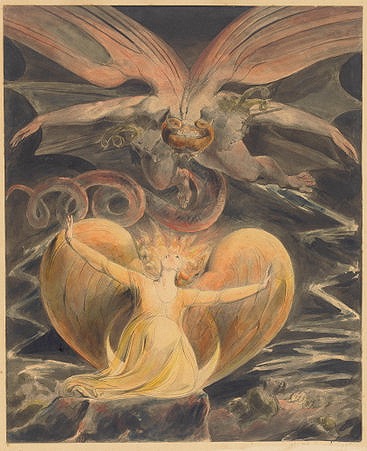
William Blake: The Great Red Dragon and the Woman Clothed with the Sun, c. 1805
"I thank heaven that the most important things tend to happen at the least convenient times."
I yesterday introduced my primary manner of living, LivingAllegorically. In in, I asserted that making meaning comprises the bulk of my life's work, that everything I perceive when looking out any window might prove to be some unlikely mirror image of me, and that it's always my responsibility to interpret whatever I experience in ways that work for me by enhancing the quality of my experience. I omitted at least half of a complete explanation, though, not wanting to muddy up the creek more than necessary to delve into such a deeply personal topic. That other half involves meaningful coincidents' apparent role when LivingAllegorically. Obviously, nobody ever manages to plan moments when a fresh insight appears. These simply seem to simply occur without volition or advanced planning, like the revelation on the road to Damascus that Saul wrote about, which was clearly not on that morning's agenda. It occurred at an apparently inconvenient time and brought what might easily be interpreted as great good fortune to a clearly undeserving character, an authentic plot twist. I believe that LivingAllegorically begs a necessity to consequently maintain a firm belief in Synchronicity, a concept, first introduced by analytical psychologist Carl Jung, which holds that events are "meaningful coincidences" if they occur with no causal relationship yet seem to be meaningfully related. Those meaningful relations seem to describe the mechanism animating LivingAllegorically, which might not be so much a philosophy as a manner of actually living, an endlessly active leaning in sort of engagement with life.
Synchroenicheatea seems to be a more emblematic way for me to spell the word because it seems so much more phonetic and mysterious. However one spells it, it remains a mysterious force, the presence of which won't move any needle on any Galvanometer.
LivingAllegorically

Allegory of Arithmetic, Laurent de La Hyre, 1650
"I might never get to breakfast or Damascus this morning …"
In the unlikely event that any of my grandkids ever ask me what I've learned about life, I would most probably respond by telling them that life seems to me to be an extended allegory, that reality isn't one percent of what it's cracked up to be, and that I believe that making meaning might be my primary responsibility here. Nothing seems as it seems and everything, every sensory experience, every dream, might carry a vast array of alternative meanings, depending. Depending upon me. I deeply doubt that a cigar is just a cigar, even sometimes, but each radiates possibility, depending. Depending upon me. I could choose to render that Freudian smoke to be simply a cigar, but what could possibly be the point of interpreting it so unimaginatively? Better sometimes, I believe, to perceive it with a touch of wonder, to check the context and discover some more meaningful understanding. It could be the clue I'd been hoping to appear that might just lead me to resolve the great mystery, or, alternatively, I could just perceive a mundane old cigar. Vitality, in my panoply, demands this more personal engagement, where I feel obligated to at least try to unwrap some deeper meaning from every blessed event and sensory experience. A rose might well be a rose and also a rose, but I also suppose that it might also be a harbinger of anything, a semi-secret messenger intent upon finally cluing me in. It utterly depends upon me to see through its initial instance to interpret something potentially more significant. All my experiences depend upon me being present.
Saul, when on that fabled road to Damascus, experienced a perfectly Standard Type 1 Revelation.
Humbility

Christ in the Wilderness, Moretto da Brescia (Alessandro Bonvicino), ca. 1520
" … lurching contest to contest, certain only of losing what we already too willingly forfeited."
And it came to pass that the people became prideful, proud of their many accomplishments and haughty within their identity; insufferable in the eyes of their neighbors, even formerly close friends. Where gratitude once swelled in their chests, an insolence replaced it and a definite arrogance overtook them. They suddenly seemed to know better the choices others should make, and even took it upon themselves to lean over others' plates to cut their meat for them without even being asked. How unappreciative 'they' seemed! Polity degraded into a me-ity, a me-for-me-and-nobody-for-all self-centeredness. Invisible hands and "wise" markets subsumed human agency and they segregated financially. They claimed The Best In The World without considering. "For whom?", and were subsumed by the promise of ever-expanding profitability. They funded their military more lavishly than they supported their progeny. They devoted themselves to promoting identity, touted as both brave and free to one another, but seemed to forfeit their former Humbility for a venial form of vanity. Then all was lost.
The ability to humble one's self might be the most human capability.
Readering
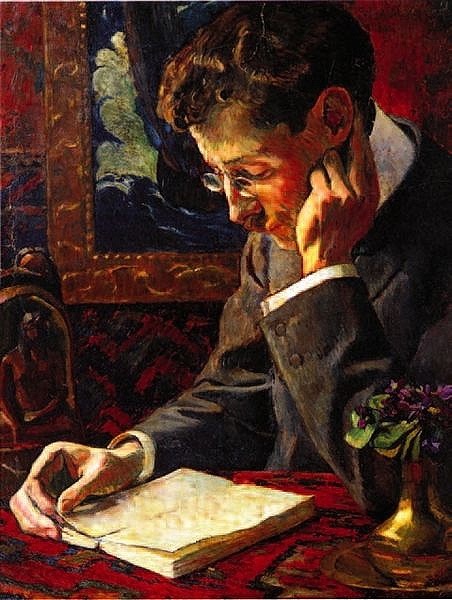
Portrait of Georges-Daniel de Monfried by Victor Segalen, 1909
"I'm feeling as if I might be a writer now."
Michael Maccoby, American psychoanalyst and leadership consultant, defined a leader as anyone with followers. Others shave pigs, insisting that some observable skills really must be present to qualify as a real leader, but I take Maccoby's side in this small controversy. It seems to me, if to nobody else, that we define many occupations in just this back-handed way. We judge singers by the size of the audiences they attract and Presidents, initially by the number of votes they get, neither by any even rough assessment of their skill. Some of the most popular recording artists torture my ears, but they're successful based upon their audience, measured by their number of listeners. This principle seems to hold true even beyond the performing arts. What's a doctor without patients? Even a librarian seems to require patrons to qualify as a true professional. Professionalism's not simply what one knows or does, but related to recognitions. Does anyone follow you? Does anyone ever listen when you sing?
Writing's no different.
FlatEarths

Wilbur Glenn Voliva's flat earth map. Modern Mechanics and Invention, October, 1931
"It can well afford to wait until we Flat Earthers catch on to its subtle significance."
In his essay The Relativity of Wrong, [The Skeptical Inquirer, Fall 1989, Vol. 14, No. 1, Pp. 35-44], Isaac Asimov presented a canny reframe of the common right/wrong dichotomy. He provocatively declared Flat Earthers' notions as not so much wrong as incomplete. For the Sumarians, who he supposed had originally concluded that the earth was flat, for most intents and purposes, their world was, in practice, flat. Earth's very slight curvature, about 0.000126 per mile, a quantity very close to 0 per mile, turns out to have been almost right and not, as moderns popularly believe, utterly and totally wrong. The truly tiny difference between zero and 0.000126 (eight inches) per mile compounds, though, as horizons expand beyond the local neighborhood. What remained obscure to the ancients became inescapably obvious to their later progeny. We might even say that most of today's more complete understandings stand atop yesterday's less complete ones. The often infinitesimal nature of significance continues to fool us as it did our forebears. Today, we have tough guys crowding together in Sturgis, apparently because, to the vestigial Sumarian part of their perception, a sub-microscopic virus shouldn't qualify as anything to get all that worried about. Right wing-nut commentators wonder what all the fuss could possibly be if we're 'only' projected to lose six percent of our population to the pandemic, and many of those folks, in their calloused imaginations, were ready to shuffle off anyway.
If this plague year should have taught us anything, it should have convinced most of us that the infinitesimals matter more than we thought.
Measuremont
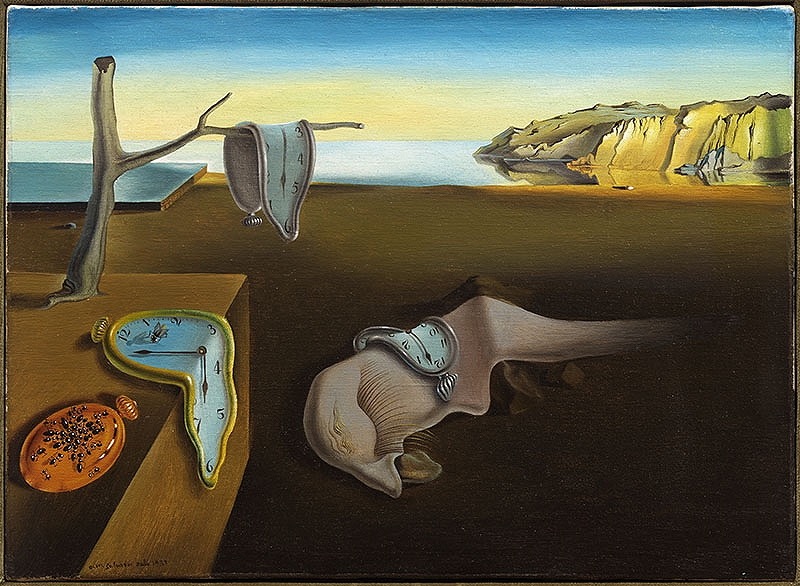
La persistance de la mémoire (The Persistence of Memory), Olive Salvador Dali, 1931
"When engaging in timeless anything, expect expectations to prove misleading."
I can never quite remember at first. The Muse and I bought two more cases of fresh tomatoes thinking we'd roast the contents of one and juice the contents of the other, twenty or thirty pounds each case. We'd 'processed' tomatoes many times before, but those experiences produced little more than vague recollections, not immediately accessible in any functional form. The roasting takes time and includes a cumbersome step where I'm supposed to pull the peel off each hot roasting half, just as if that were humanly possible, while scorching my fingertips. How terribly renewing! Juicing involves little more than coring, quartering, and heating, then crushing in the Foley® food mill, an inherently picky and frustrating business. I finally plug into my vestigial muscle memory and set myself to work, slicing, salting, seasoning, and roasting. The recipe says check after twenty minutes. After twenty minutes, the roasting halves seem unaffected. I set the timer for twenty more minutes and settle into finish that novel while I wait. I repeat this cycle twice more before the tomatoes seem in any way peel-able, then painstakingly set about successfully performing the impossible ritual. I'm more than two hours into what started out as a twenty minute expectation by the time I decide that I'm done roasting and it's time to start canning.
I'd gathered the little jars while the tomatoes roasted, and also set the lids to simmering on the stove top.
WillfulWisdom
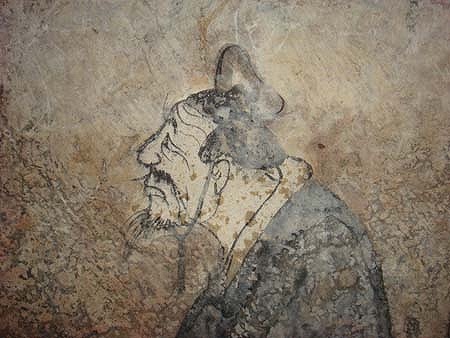
Fresco depicting ancient Chinese philosopher and educator Confucius (551 B.C.-479 B.C.), found in a 2,000 year old tomb in an old residential yard in Dongping County, east China's Shandong Province.
" … we generally do not seem to conform to gross generalizations."
I sincerely wish that there were a wise counterpart to the wave of willful ignorance presently washing over us. Willful Ignorance, for the unfamiliar, is a polite way to describe stupid. It's polite because it presumes adequate intelligence, which only seems fair since measuring anyone's intelligence proves inconvenient and often impossible in the course of a casual interaction, so it concludes that in spite of adequate brain power, someone's apparently worked very hard to come to a delusional conclusion. These delusional conclusions are often quite provably fallacious by employing nothing more dangerous than elementary logic and … ahem … facts, but they tend to spark a childish round of 'call and denial', an equivalent to the old I Know You Are But What Am I? game of our youth. There's no talking with anyone entranced within their own twisted justifications. They've invested heavily in a storyline unsupportable by any rational or experiential means, a genuine flight of fantasy, but apparently will not divest, probably because they cannot without forfeiting a long-trusted element of their identity. I think of Willful Ignorance as a particularly virulent form of denial, a bury-the-head-in-the-sand strategy certain to ultimately betray even the truest of true believers. My usual strategy when encountering the apparently willfully ignorant involves sort of just putting them out to pasture. They do not appreciate my questioning and I don't really need their sideways justifications' lead weight in my life. Neither of us will be in the market for evangelical transformation.
What would a wise counterpart to willful ignorance look like?
GodGiven
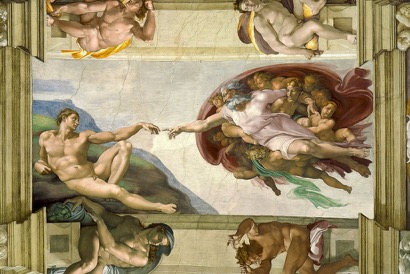
The Creation of Adam; by Michelangelo; 1508–1512
"We're never less powerful than when we're armed and asserting our folly as some GodGiven right …"
I was up early again this morning pondering how I might distinguish between the various rights asserted by those around me. The right wing gun nuts insist that they merely enjoy a GodGiven right to bear arms, though I recall no actual scripture reporting the granting of this authority. Others proudly sing that God somehow "shed his grace on thee," which I interpret as meaning "God shed his grace on me", or somebody, though I have no clue what shedding grace might entail or what might logically result from this act. Mention of it does seem to reliably encourage pride, the sort of pride which supposedly does not immediately precede a fall of any kind. Grace seems the iffiest of gifts, whomever might bestow it, for it always seems more resident in the eye of the bestowed than anywhere else. In spite of the widespread belief in the existence of godless heathens, each and every war ever fought seems to have been engaged in by self-certified God's own representatives on this earth versus self-certified God's own representatives on this earth, and expressly for the greater glory of God; not their God, but the one and only true God, who just happened to be on "our" side.
God gets used as an excuse for almost everything, and I suspect that she's not all that pleased with these attributions.
Hop(e)
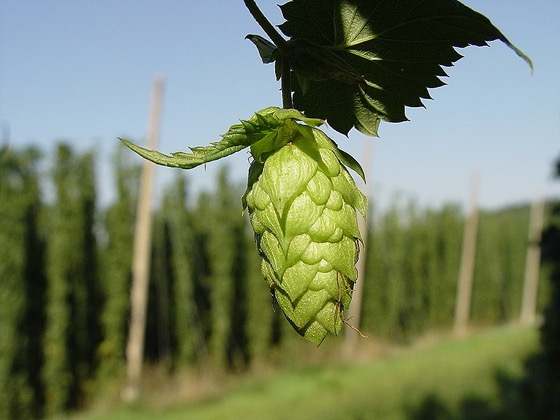
Hop flower in a hop yard in the Hallertau, Germany (Wikipedia)
"Something significant seems to have stuck with me …"
My father, who was born near the Willamette Valley German immigrant town of Mt Angel, told of working hop harvest. Long days standing on the tall bed of a high-sided flatbed truck, reaching up to cut the cords holding the twenty foot tall vines into the truck bed would leave his forearms raw. Even then, the work beat picking beans, which was stoop labor and hard on the back and also left forearms chafed. I'd seen the hop yards, since I'd grown up near the preeminent hop growing region in this country, and dreamed of growing my own someday. I'd tried several times, always with disappointing results, short, rather sickly specimens yielding few of the treasured cones. I'd crafted small pillows filled with dried cones, which are said to induce sweet dreams, but had never more than dabbled in their cultivation until this year, this seemingly hopeless growing season. I'd late last summer finally found a plant at a local nursery, for which I'd paid a small king's ransom, and planted it in front of the fine, tall cathedral window out front, thinking that perhaps it might at least yield some interesting shade. That plant grew a begrudging six feet or so before an early snow halted further progress. I pruned it to the ground and forgot about it until Spring, hoping that it might prove eternal enough to sprout up a second year.
This Spring needed hope like no other I'd known.
ShiftIn
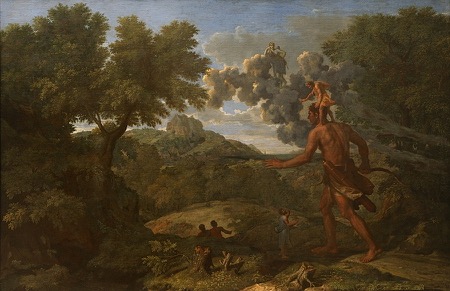
Blind Orion Searching for the Rising Sun, Nicolas Poussin, 1658
"I'll relish what little's left …"
In these mid-latitudes, weather comes out of the West, moving opposed to the sun's progress. Little of consequence comes out of the East, which is where we send our weather when we're finished with it or it's finally finished with us. Occasionally, some counter-clockwise rotation kicks in to produce what we call upslope winds. These can spawn magnificent thunderstorms in the Summer and genuine dumpers of snow in the Fall, Winter, and Spring, but these bring nothing in the way of lasting change. They appear and leave almost as quickly, handing the reins back to the West winds again. The only question is always which direction, Southwest or Northwest, will the weather come. Through summer, Southwest winds prevail. One day, a ShiftIn happens and the prevailing winds starts sliding down from Idaho or Montana pulling in Northwestern weather. This ShiftIn comes quickly and never quite fully reverses again that season, a certain sign that autumn's coming, though it might have been a hundred degrees in the shade just the day before.
Real rain, not that second or third-hand stuff stuff passing up and over Arizona from the Gulf of Mexico, but genuine North Pacific rain drenches everything.
FalseEquivalence

Gino Severini, aged 30, at the opening of his solo exhibition, Marlborough Gallery, London, 1913
"Wallowing in FalseEquivalence demonstrates an ignorance unbecoming anyone."
One of these things is not like the other. This one statement might properly summarize human existence, for we seem to (or, at least I seem to) constantly make distinctions. When my kids were small, we parsed the entire universe into two broad categories, Yum and Yuck. With these broad two generalizations, infinite variations might exist, but no Yums ever became Yucks, and vice versa. Once initially classified, little risk of mistaking one for the other existed. One was definitely not like the other. This universe, though, cannot be parsed so conveniently. We encounter many borderline cases, greyscale experiences which might seem indistinguishably similar, though actually different. Multiple classifications are also common, such that similarly-colored objects might also be more finely graded by size or shape. As the Ancient Chinese used to insist, ten thousand differences might exist between any apparently similar objects or events, but we've evolved into ever less discerning generalists, it seems, satisfied to call both apples and oranges 'fruit,' and leaving further distinctions pat, and we're fine with that other than the occasional disagreement over classifying tomatoes. Fruit or vegetable? A fruit that tastes like a vegetable or a vegetable crudely misclassified as a fruit? Wars have started for less.
All this distinction-making might serve to help us make sense of the world, but a tremendous amount of skill seems necessary to make proper distinctions, to avoid misclassifying one thing as another when it really isn't.
SmolderingPants

Psalter (the 'Shaftesbury Psalter') with calendar and prayers
Origin England Date 2nd quarter of the 12th century
"We might have been born to advance higher purposes of civilization …"
We apparently love to be lied to. I find no other way to explain civilization. Societies and cultures might exist solely to maintain and reinforce myths, reassuring lies sustained for solace. We seem to not-so-secretly believe most everyone else a rube, easily fooled, many emphatically insisting not that we hold certain truths to be self-evident, but that we're good for keeping the dirty little secrets quiet. I suspect that most of us know too well how deep down lame we are inside, how utterly dependent we are upon lying to ourselves and to pretty much everyone else to maintain some cobwebby semblance of self-esteem. Even if the much-vaunted truth actually made good on its promise to set us free, we'd most likely choose to remain in slavery to the studied reassurances that, no, these pants do not make our butt look big. We've elevated the completely spurious Energy Drink Industry to comprise a significant portion of our retail economy. Need I say more? Sugar water spiked with caffeine, and some even spiked with measures of, excuse me, bull pee. I mean, how gullible must we be to drink that crap? It seems to me that this reality simply could not be without a deep and underlying identity insisting that you absolutely must lie to me and that I solemnly promise to keep the little secrets between us. We apparently sincerely believe that we cannot handle the truth.
We wear SmolderingPants which, if the old adage — where there's smoke, there's also fire — holds true, our pants are actually on fire.
Heraclitus'Insight
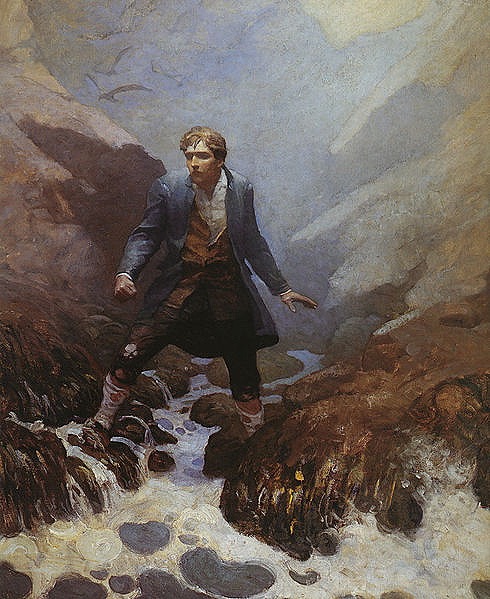
On the Island of Earraid, N.C. Wyeth, 1913
"No man ever steps in the same river twice", Heraclitus, Fifth Century B.C.
"No squirrel ever entered the same deer meadow twice."
Heraclitus might just as well have said that no man ever steps into the same morning twice, or sits in the same chair, or reads the same book. Further, he might have just as credibly insisted that no two people ever read the same book, not even once. Any author might, as I have, ask, "What book did you read?" when receiving feedback about their work. We seem to live within an almost constancy, surrounded by seemingly familiar objects and people, but these relations seem surprisingly fragile as we continuously rediscover that each might not be quite what we'd earlier concluded about them. Shocking moments of inconstancy punctuate our experience here, amplified, no doubt, by our abiding sense that things properly stay more or less the same, when they don't and never have. My continuing disorientation might well be self-inflicted, but I cannot seem to uncover any balance or Golden Mean between these two apparently opposing forces: stability and flux. Heraclitus also insisted that "panta rhei", everything flows, that nothing ever stays the same. I wonder why, then, we evolved to believe so vehemently in constancy, that everything's more or less frozen in place?
Glib self-helpless pundits blithely insist that the more things change, the more they stay the same, by which they might mean that most change seems insubstantial, a rearrangement of the proverbial Titanic's deck chairs.
'Vesting
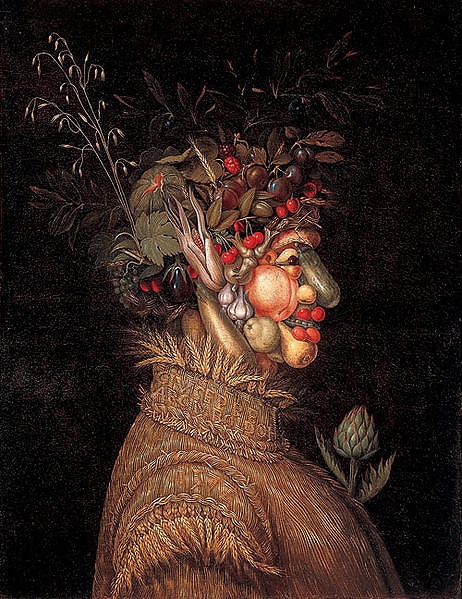
Giuseppe Arcimboldo, Summer, 1572
" … 'Vesting providence with our experience again."
Most of the growing year involves much waiting, culminating in a few shortening days 'Vesting: harvesting, preserving, labeling, and storing away for later use. There's no shortage of delightful fresh produce groaning shelves this season, the produce stand suddenly the most popular stop on everyone's rounds. Would that I could find this freshness year 'round, but I savor what I find when I find it. We neglected canning tomatoes last 'Vesting season, and lived to deeply regret that decision once sequestration stripped our larder shelves. For the first time in years and years, we reduced ourselves to buying factory canned, and regretted every second of the experience. We'd thought ourselves well-enough provisioned before our world sucked in on us. By then, it was way too late to rethink, and we sucked it up and tolerated the consequences. We'd foregone perhaps the single most solidly imprinting experience of the year last 'Vesting period. We'd been traveling when the tomatoes came in and recovering through the balance of the season. We missed that chance.
Now, we insist that this must never happen again.
HownDogAfternoon
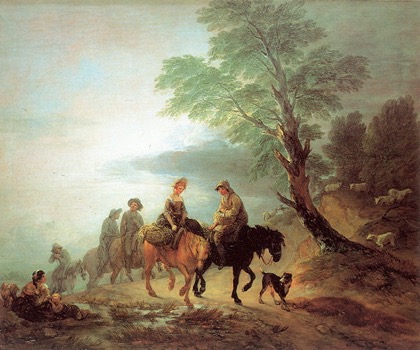
Going to Market, Early Morning by Thomas Gainsborough, circa 1773
"We're partners here …"
If I'm going anywhere today, I'd be wise to go early, before the sun and the smoke and the aridity become even more determined to have their way with me. I thought I caught a patch of blue in the sky this morning. The wind shifted overnight so I woke without my eyes stinging themselves shut again. My throat feels rough and the consistency of tapioca pudding, sinuses screaming again. By the last week of August, the elements combine to produce a neigh-on to unlivable environment. The lawn feels crispy underfoot regardless of gold-plated sprinklings, thin underlying soils seemingly thinner after rainless weeks. The monsoon never showed up this year. As each day progresses, the slight almost cool of early morning gives way to another baking, the sun, even through the smoky batten burns without thinking once. The sunrise lasts much of the morning as the smoky haze extends the reds and oranges until nearly noon. Afternoon seems fit for little more than napping, perhaps in a puddle of fine dust, the way an exhausted HownDog might approach it. Time fit only for practicing hibernation. There's no place to escape to but dreams.
The view from every lookout seems cruelly foreshortened and spare. I drive in a tunnel of heavily amended air
MuseDay

Mérode Altarpiece (or Annunciation Triptych) is an oil on oak panel triptych, now in The Cloisters, in New York City. It is unsigned and undated, but attributed to Early Netherlandish painter Robert Campin and an assistant. The three panels represent, from left to right, the donors kneeling in prayer in a garden, the moment of the Annunciation to Mary, which is set in a contemporary, domestic setting, and Saint Joseph, a carpenter with the tools of his trade. The many elements of religious symbolism include the lily and fountain (symbolizing the purity of Mary), and the Holy Spirit represented by the rays of light coming through from the left hand window.The central panel was completed after 1422, likely between 1425 and 1428. [en.wikipedia.org]
"She insists that she's an A-Me instead."
She despises the moniker, or certainly says that she does. I persist using it, and not merely out of perverse habit. (In her birth family, once anyone learned what you hated, that knowledge guaranteed that you'd thereafter be inundated with it.) She was by any measure born the runt of her family, a premie as we call them today, and so had to stay in the hospital for several days after her birth. She claims that this rude arrival affected her. She still remembers feeling abandoned and alone when isolated from her newly-gained home. Being third in birth order, ultimately the middle, she was born behind, destined to always playing catch up, a childhood-long competition she was destined to lose. She won the race to produce the first grandchild, though, and so was carrying him at her high school graduation, whereupon she went into exile to live with hostile in-laws and a sullen showband drummer of a husband. She coped. She lived as a band wife for almost a decade, holding menial jobs to pay bills, including a stint cutting meat in a huge packing plant and later, as a Tupperware Lady®.
She finally decided at twenty-five to put herself through school, which she managed to do in fairly short order, ultimately choosing her own curriculum to satisfy her own notions of how that work really should be done.
Q

Guy Fawkes before King James, Sir John Gilbert, Circa 1750
"They ache for judgement day."
They meet in out-of-the-way places, a shed on one member's family farmstead, warmed by a barrel fire fed with scrap lumber. Their meetings combine the camaraderie of a frat brother kegger with the solemnity of religious retreat. One member, typically the host, leads but never in a domineering way, for these men never responded well to dominion. Lifelong misfits, they hold exclusively non-professional jobs, laboring, mostly. They to a man struggle to make ends meet and always have. Those who managed to make it through high school, graduated with a certificate in serial humiliation, for they struggled with their studies, never quite grokking college preparatory courses in math, literature, or the sciences. They hold grudges, not degrees. Many showed early on real promise in the mechanical arts, auto repair, electronics, and the Future Farmers of America programs. They're all hunters. Each owns several guns and each considers these the pinnacle possessions of any freeman. They insist that they're freer than they've ever once felt and meet to garner their resources for the oncoming assaults on what they authentically revere as their way of life.
They think themselves worthy inheritors of Colonial-era beliefs, thinly evolved first or second-generation interpretations of The Rights Of Man and The Wealth Of Nations, though none have read the original documents, much less considered their many contradictions.
deCENTcy
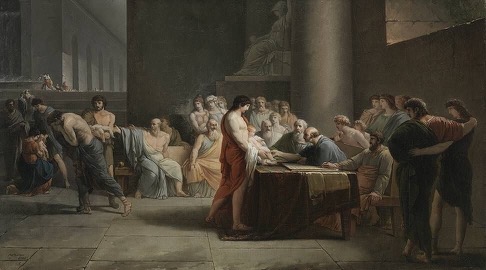
Jean-Pierre Saint-Ours, The Selection of Children in Sparta, 1785
At the age of 7, Spartan boys were removed from their parents' homes and began the “agoge,” a state-sponsored training regimen designed to mold them into skilled warriors and moral citizens.
"I genuinely want you to win, too, though never at any cost, …"
In this world where everything seems to have a price tag and few of us understand the cost of anything, deCENTcy often seems lost in the accounting. Schemes surround and smother us. Deals get made. Compromises demanded, the Bait And Switch almost obligatory. Fair deals, the rarest of all deals. Cheap-but-Good seems more weighted in favor of cheapness than goodness. Loyalties seem far too easily persuaded to switch support to shave a few pennies off some bill. Some commodities solely serve ostentation, valued by the excess expended to acquire them, for bragging rights or simply to rub some less fortunate's face in the deal, offered only at auctions where we're perennially out-bidded. Our democracy sometimes seems like that. We wonder why we should even bother entering the game. Our politics have been up for sale to the highest bidder for generations now, and only DeCENTcy seems absent from the equation because DeCENTcy costs almost nothing, a red cent lost in rounding among bilious billions and terrifying trillions. Where's the marketplace in deCENTcy these days?
Oh, here it is, right close to home.
LOM
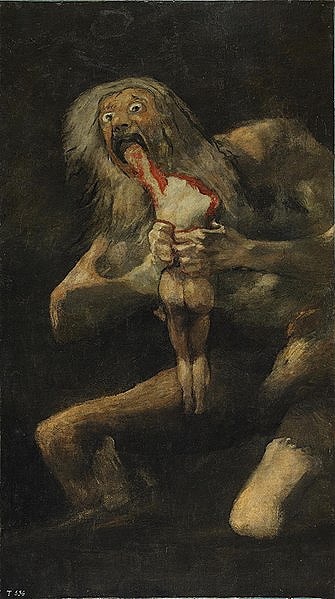
Francisco de Goya, Saturno devorando a su hijo [Saturn devours his son], (1819-1823)
"The more I've experienced, the less I understand."
Birthdays increasingly become subdued celebrations as I age. A passing embrace, a few quick questions asking what they might do for me, an overwhelming number of Facebook greetings, each unexpected, of course, and each relished as a slightly embarrassing excess. I register my appreciation in a sort of passing because I do not feel as though aging or even counting ages accomplishes anything. I spent the day feeling rather full of myself, greatly gifted by the virtual presences surrounding me and I fear a little too off-putting to those closer to home. I find attempts at celebrating at root unnecessary. They elicit little more than sincere 'aw shuckses' from me, which might mean that I'm finally entering that inevitable stage of being, that I'm turning into a LOM, a Little Old Man.
I've noticing myself getting ever more stuck in my ways, as if the sum of all my days had reached maximum absorption of experience, as if my existential larder might be almost full.
RegularOrder
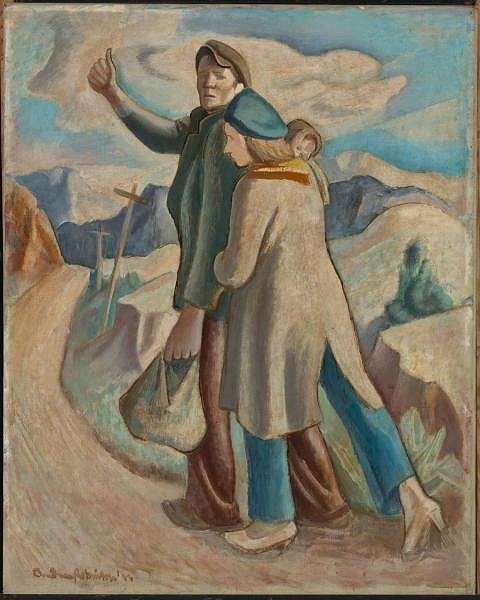
Going West--1933, Boardman Robinson, 1933
"I'm not fleeing anywhere …"
I've started this story three times already, discarding each iteration in growing frustration. I wanted to say how it feels for me to be alive this morning, but a certain seething crept into each attempt. I do not feel like an angry old man, just one aching for RegularOrder. I've had it up to somewhere with stupid millionaires dominating conversations. There seems to be no better indicator of absolute inanity than wealth, as if mammon actually lowers IQ. The disruptive elements, the great inventors and marketers and promoters, seem to lack any sense of RegularOrder, the baseline regulating force each of the rest of us rely upon to maintain our sanity and serenity. I feel lucky this morning to be turning three score and nine. It's my birthday, for cripes sake, and I feel satisfied enough just to take what I've been given. The decktop petunia garden's at her peak, perfume creeping up and into the master bedroom windows. My hop(e) vine's cones have grown heavy with pollen and ready for harvest. The front garden's in furious bloom attracting hummingbirds and bees and grasshoppers in profusion. The cats, still kittens a few short weeks ago, have almost learned to come back home on their own after they escape.
The wind seems to have shifted.
GrudgeWork
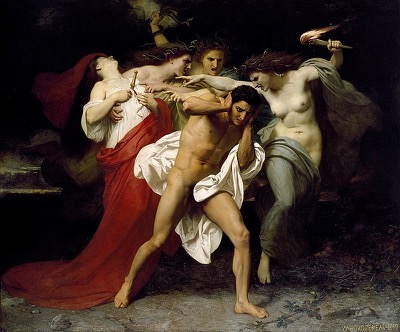
The Remorse of Orestes by William-Adolphe Bouguereau, 1862
"La vengeance est un met que l'on doit manger froid" Charles Maurice de Talleyrand-Périgord (1754–1838)
"Revenge is a dish best left off the menu"
Setting out to settle any score seems to reliably produce some variant of the opposite of the imagined outcome. Revenge is not, as Talleyrand-Périgord insisted, a dish best served cold, but a dish best left off the menu. One might easily imagine settling some score, as the saying goes, 'once and for all', but such action produces reverberations guaranteeing that those scales will very likely be thrown even more permanently out of balance. Should the reaction be anything close to equal and opposite, a tragic cascade will likely ensue. Dogs chasing their own tails easily then becomes the new normal, for grudge lust never finds satisfaction from any GrudgeWork, however dedicated. Getting even amounts to a distraction, always under the influence of our worse angels. The reparations exacted upon the Weimar Republic following WWI produced Hitler and WWII, even though the French and British firmly believed that their demands were just. Germany had, after all, aggressively thrust itself upon France for no reason other than its deeply held grudge over having missed building its own empire. Why not simply swipe another's empire and thereby better balance the score? We now too well know why, but we never seem to learn.
GrudgeWork properly describes our current administration's approach to governing.
NothingAndBeingness

Time Saving Truth from Falsehood and Envy, François Lemoyne, 1737
" … they'd come to understand and trust that the horse knows the way."
I believe, perhaps fallaciously, that I possessed when I was born every skill I later manifested. Contrary to the historical record, not even the KnowNothings ever actually knew nothing, not even those swearing to reelect our sorry excuse for a President can truthfully claim this state, for nothing's always been fundamentally unknowable and to claim otherwise only proves my point. I have not so much assimilated others' skills, but found ways to relate theirs to my own, nascent and previously knowable until after some small or huge revelation. I perceive this world as a network of invitations in constant struggle against the forces of formal education, which seem determined to claim ownership of knowledge and skill so that they might sell it for notoriety and profit. Knowledge, interestingly, also fails to qualify as knowable, though some certainly seem to exhibit clear possession. It might be that knowledge and even understanding possess us and not the other way around, once one's found fertile ground them to usefully relate to it.
If I would have had to know how to write before writing, I might have become an eternal student, Hell-bent on learning something unassimilatable by that means.
RueTeen
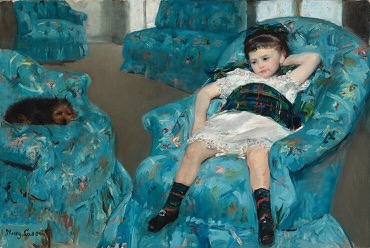
Mary Cassatt, Little Girl in a Blue Armchair, 1878
"Some blessed shirker inside me has been complaining …"
How many times can I repeat an activity before repetition renders it banal and boring? What begins as necessary and refreshing might well become a crushing obligation over time. A perfectly timed taste of wine too easily slumps into an unmemorable second glass or a forgettable third. I've heard of activities so enjoyable that they never eventually bore anyone into a coma, but never actually experienced one. Experience seems to sum into something quite distinct from mastery, something more akin to a tragedy of over-familiarity, rendering almost alien through studied repetition, leaving the practitioner aching only for a beginner's mind again, a refreshing starting all over again from the bottom. Our Damned Pandemic has highlighted the utter banality of many of my RueTeens, activities I now rue performing and perform with all the mindful tranquility of a slighted teen. I might agree to do anything besides what I've become altogether too accustomed to doing after the umpteenth time anticipating doing it again.
Dinner, once creative opportunity, has become an utterly boring chore.
Chokin'

Fainting by Pietro Longhi, 1744
" … this, too, was intended to be a part of the deal …"
This terrarium's oxygen seems just about used up. We closed up the place as the smoke concentrated, using fans to keep the suddenly suffocating inside air moving, but it moved increasingly listlessly anyway, suddenly neither fresh nor refreshing. We continued breathing, but substituting low octane for high test air, each breath an increasingly sorry pretender to what we'd grown accustomed to experiencing. Usually, the breeze here brings continual relief down from The High Country, some of the freshest air in the world. During fire season, it billows. Nearer the fire lines, ash falls like heavy snow. Here, it's only smoke bringing persistently itchy eyes and a choking sensation deep in the throat. And there's no respite. No cool glade to escape into. No secret room in the basement unaffected by this intrusion. I choose to sit on the deck as the day grows long, nose running and eyes tearing up. I get scowled at for leaving the slider open.
We're in no real danger here.
Smokin'

The Smoker, a presumed self portrait of Joos van Craesbeek, 1635-36
"I closed the side window so the breeze can't push fresh puffs inside on me."
I was a dedicated smoker in my youth, sneaking smokes out on the football field during lunchtime at high school. Slinking around, I mostly learned how to sneak there. My parents were raging liberals when it came to smoking, figuring that they'd rather we not sneak around at home. My dad, brother, and I thereby inflicted second-hand smoke on everyone else in the house, not so much indifferent as ignorant of the damage we inflicted. I quit in a fit of righteous self discipline on the new year when I would turn thirty-five, figuring that smoking was a young man's game and I was headed in the wrong direction to avoid one of the dead certain afflictions should I continue the habit. The Insurance Company had just before instituted a strict no smoking policy and I didn't relish becoming one of those poor souls forevermore hovering around a drizzly courtyard. We speak now of castes and classes. When I stopped smoking, I was immediately upgraded a class. I bruised my left nipple for months after from constantly tapping my shirt pocket, checking for the accustomed pack which was no longer there to cushion my panicky inquiries.
I later picked up cigars, fine little Dominican ones which I fallaciously claimed had been hand-rolled on the thighs of virgins.
DogWhistlingInTheDark
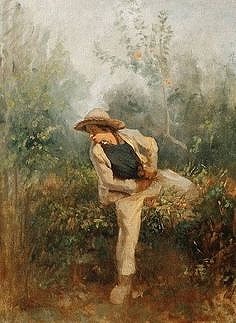
The Poacher, Jean Pierre Alexandre Antigna
"We're the ones inheriting that wind."
By mid-August, mornings smell of campfire, though campfires have been banned since May. The primary East/West freeway across the state was yesterday closed until further notice due to a zero contained wildfire burning through Glenwood Canyon. Even the transcontinental train service was suspended until further notice. The round and about alternative route, a twisty two lane up through Aspen, was closed after a semi-truck jackknifed on a tight switchback turn. Sunrises and sunsets come in brilliant oranges and reds and our usual pristine view up the Front Range is filtered through a smutty haze. We're suddenly all smokers again, shirt collars reeking and sinuses clogging. The sign at the county park reminded hikers that rattlesnake activity has been reported in the area, so keep those pets leashed and keep yourself safe. Everyone leaves reminding everyone else to stay safe. The world seems especially dangerous right now.
The Presidential race is off and running now that Biden has named his running mate, a formidable African American/Asian woman the opposition can't yet properly denigrate.
Disorienteering
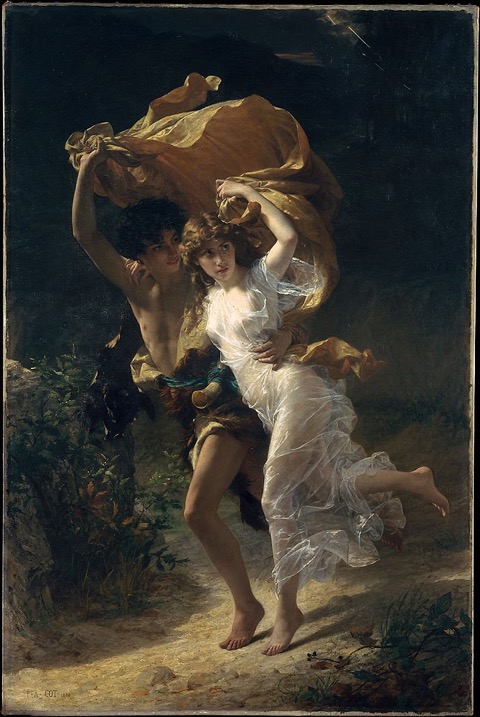
Pierre-Auguste Cot: The Storm, 1880
" … I lagged my way back home."
Sequestering provides few opportunities to get lost in anything more diverting than another fresh novel, fleeing ever inward as an antidote to such outward sameness. Suppers eventually come to seem like reruns. Didn't we just have this last night, or was that just the night before? Exploring the unchartable territory west of boring, each little chore hardly seems worth doing, fresh adventure insecurely out of reach. I've grown to know my neighborhood perhaps a little too well. Discovery only ever happens once, after that, it's simply not discovery anymore. An ennui settles over the proceedings and forward comes to feel like warmed over receding, a form of retreat. Mid-August brings vacation season for one excellent reason. It's damnably difficult to get lost at home. I know where every left turn will take me. I understand what's just over every hill. The thrill of discovery eventually slips beyond anyone's grasp and we're compelled to just disappear in favor of some Disorienteering.
We vacate to get ourselves lost.
Gumshoe
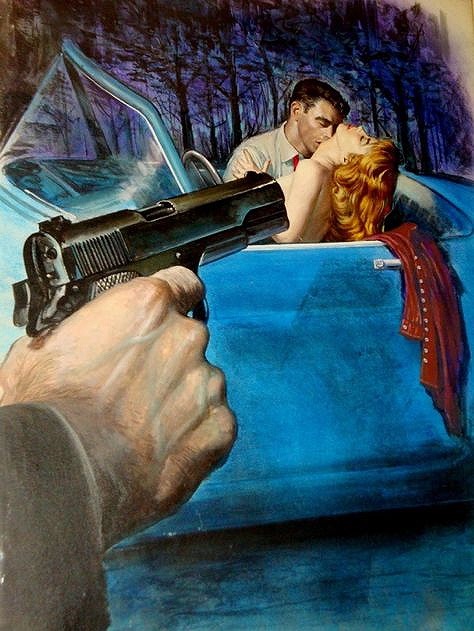
Harry Barton Vintage Pulp Art Illustration
" … when Amazon options it for the limited series."
As an enthusiastic consumer of Detective Fiction, I fear for the future of this genre. I've not yet encountered a character in any Gumshoe novel who wears a face mask other than to bump off a liquor store, and those masks don't seem right for blunting any plague. None of the heroes seem the sort to slip unnoticed into a cocktail bar while wearing a mask, and cocktail bars have been closed for months, anyway. Where do nefarious schemes get hatched in pandemic times? I'm trying to imagine C. J. Box's Joe Pickett or James Lee Burke's Clete Purcell operating in a post-pandemic world or Longmire issuing citations for violating mask mandates. Masks might inhibit identification of the Gumshoe's prey, though I notice that John Sandford's latest thriller came out under the timely title of Masked Prey, though there were no masks prominently displayed in any part of that story.
Few advertisements, even now, six months into this pandemic, feature mask-wearing characters.
TakingAPass

Thomas Moran: Mosquito Trail, 1874
" … a full immersion experience one can almost bring back home with them."
This Damned Pandemic encourages a discernment and detachment in me. I no longer feel free to enter just any establishment. As if I possessed a picky palate, I simply will not enter any restaurant, not yet. I might consent to a drive through or an accelerated step in to grab something to go, but I will not slow down long enough to even leave a footprint on my way through. I wake some mornings aching for a decent order of hash browns smothered in green chile gravy like only an authentic greasy spoon diner can produce, but I will not reduce myself to enter any such establishment. Not yet. Not now. I sense that I'm becoming somewhat of an expert at TakingAPass, just driving past though my desire might compel me to stop. I sense myself a budding aesthetic, like a solitary mountaintop meditating wise man, though I know for certain that I remain a simple wise guy deep down inside. I'm TakingAPass because I've grown to distrust all reassurances that we're bringing This Damned Pandemic under any sort of control. We're still learning how this devil works, and until we deeply understand it, I will continue to choose to just drive by most roadside attractions, even when I'm starving for that plate of smothered hash.
Living in Colorado offers some compensations.
LittleDeaths
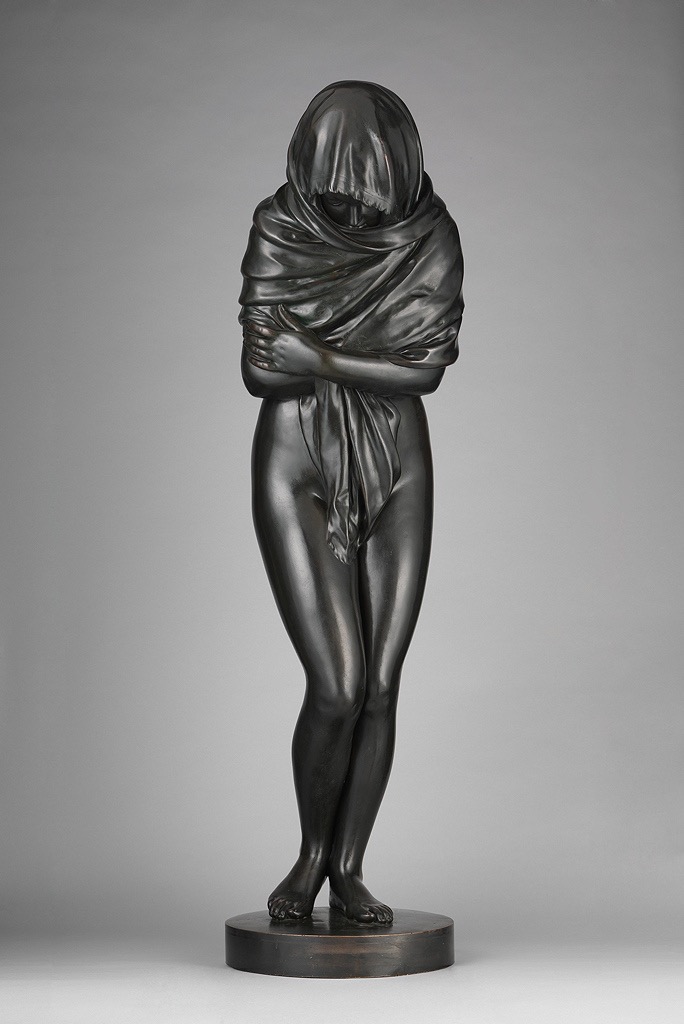
Winter by Jean Antoine Houdon, 1787
"Background moves into foreground sometimes …"
Life presents many LittleDeaths, sudden absences disrupting flow. These experiences might seem mere inconveniences to any casual observer, but the principal deeply feels their sting. Yesterday, returning from our usual larder stocking excursion, I felt my shirt pocket for my eyeglasses and found them AWOL, missing from their pocket perch. I initiated a quick search, well experienced with discovering that I'd set them down somewhere. I could not immediately recall where I might have left them, but I reassured myself that they could not be far. As near as I could tell, they were precisely nowhere: lost, gone, disappeared. I quickly engaged in denial, sensing that they simply must be near, even going so far as to just wear my prescription sunglasses to read a chapter or three in the latest library book. It would too soon turn dusk, though, so I headed out to the drug store to score some cheaters, cheap magnifying lenses to help me make do.
I still firmly believe those glasses will show up, though I'm plotting a visit to my optometrist tomorrow morning.
Worker

Jean-François Millet, The Gleaners, 1857
"I might have been a gleaner."
I am most emphatically NOT a Worker. I haven't punched a time clock since I was in my teens, and even then, I found that experience to be anything but uplifting, demeaning. I can't seem to count my efforts by the widely-recognized Hours Metric. I do not quote anybody an hourly rate. Back at The Insurance Company, as a young professional, the accountants drooled over the prospect of collecting activity-based data and received instead, carefully crafted fiction, for few could perform tasks without forfeiting awareness of time passing, not without abandoning the possibility of experiencing the elusive flow. I'd go down to the employee cafeteria each Friday morning, carrying my agenda which I'd once again failed to maintain in scrupulous detail, and create my fictional record of my work week just passing, careful to avoid any appearance of idleness or overage. My job demanded that I always attend to about fifteen different things at once, never once single-tasking, so any notion of activity-based accounting seemed absurd, but only because it genuinely was.
Austrian Political Economist Joseph Schumpeter explained how economists gather their data. He said that watchmen report it and that they report whatever they damned well please.
Discretion

Jan van Eyck: The Virgin of chancellor Rolin. (circa 1435)
"Buck up, Brother, we're in this together however we play it."
Discretion, proverbially referred to as the better part of valor, was originally intended to caution that it's generally better to avoid a dangerous situation than to confront it. Modern interpretations of this term seem to vary considerably from the traditional intention, though, as one governor after another publicly insists upon relying upon personal Discretion when taking certain necessary precautions against The Damned Pandemic, like wearing masks when in public. School principals, too, have adopted this approach, instructing students to make their own choice about whether or not to wear a mask when shoving through class changing crushes. Name one other choice a typical principal leaves up to students? Just one! Given a choice of wearing pants or not, about a quarter of high school students would gleefully observe pants-less Fridays! Should completing homework, or, indeed, all schoolwork be left up to the "Discretion" of each individual student? How about attendance?
The idea that Discretion means free to choose whatever seems upside down and backwards, but then not everyone aspires to valor.
SlicingBread
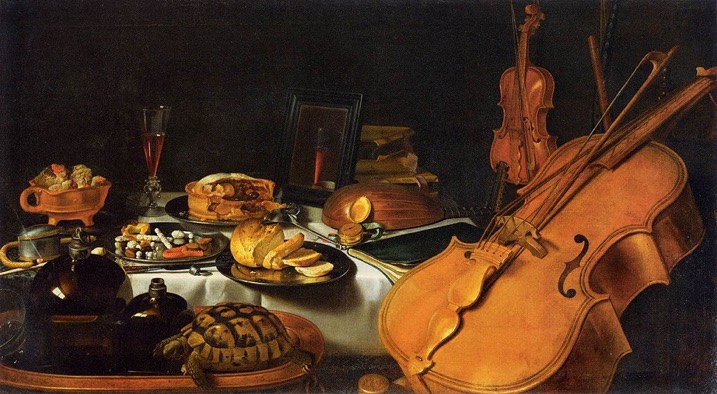
Pieter Claesz, Still life with Musical Instruments (1623)
"Bless This Damned Pandemic for reminding us how."
I speak this morning in praise of blessed inconvenience, as embodied by the once-familiar act of simply slicing bread. With the exception of that period when my mom went all Earth Mother on the family and took to baking her own bread, my early years experienced exclusively the pre-sliced variety bought day old in a small bakery for ten cents a loaf and stored in the trusty basement freezer. I saw in books photographs of the kind of bread people bought in Europe, dark, rotund, and unsliced, and I dreamed of pulling off handfuls to accompany some whiffy cheese, but we were no longer Europeans, and hadn't been for generations. As Americans, we never really thought about most of the conveniences we shared. We thought them a birthright accompanying what was more than simply The Good Life, but the very best life imaginable. Beret-wearing Communists might walk straight-faced while carrying a baguette or boule, but we never would, and not just because we couldn't.
Then I came to test taste a plain baguette and found it good. No, I found it far superior to any sponge cake imposter.
RushingRoulette
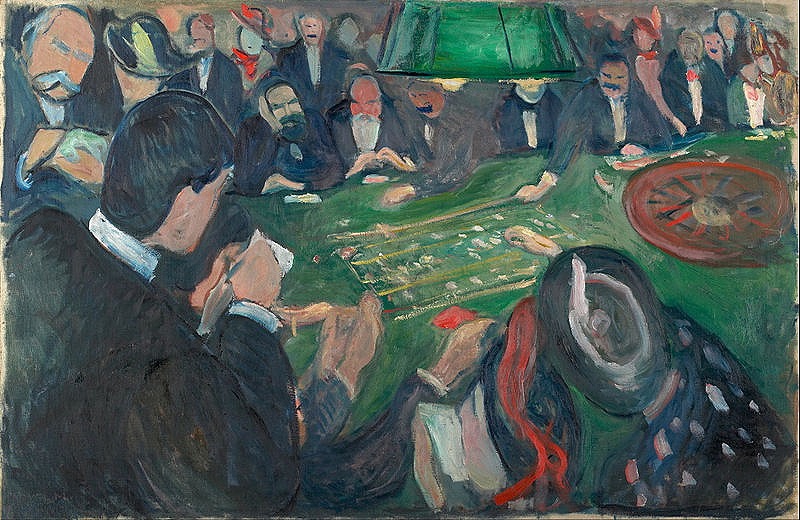
Edvard Munch, At the Roulette Table in Monte Carlo,1892
"Rushing into any roulette seems a fool's mission."
Every morning, some oleaginous politician encourages me to resume my "normal" activities, citing genuine statistics to justify their advice. I deeply doubt if they understand a word of their own justifications, for oleaginous politicians have never been elected on the basis of their deep understanding of Bayes theorem, or any other concept underlying statistical projection. Judging from the wild divergence between predicted and actual, their understanding might well be nonexistent, but true to all of us genuinely innumerate, mere failure to accurate predict hardly dissuades another morning spent hawking spurious convictions. Statistics has always been hard, mostly because our intuitions sucker us. Unbiased analysis demands an almost inhuman indifference and strict adherence to tenaciously counter-intuitive processes. Even analyzing results easily sucker-punches us, since we sometimes desperately want the numbers to agree with our a priori expectations, and when they do not, we're likely to fudge, touting the portion of the results that agree with us and burying those that don't.
We wallow in numbers now.
StayingPut

Artemisia Gentileschi’s Judith Beheading Holofernes, ca. 1614–20
"Not stir crazy yet, not by a long shot."
In this culture, we believe that strange things will happen to us if we simply StayPut. In Buddhist cultures, stillness might be aspired for, even revered, but we're a kinetic crew over here. We're up and gone as a matter of ingrained routine. We feel as though we haven't accomplished anything unless we've gone out somewhere then returned in-between. We make many round trip runs, almost always ending up just about where we started from, but with the added benefit, I guess, of having sandwiched a gone in there between the anchoring StayingPuts. If I were to deeply immerse myself into StayingPut, I might start stalking the hallways with an axe, chopping holes in otherwise perfectly innocent doors, slathering. I maybe might even turn into a creepy isolated old cat lady, newspapers piled to the ceiling. Or a shut-in, font of endless neighborhood rumors of what I might once have been, a definite haunted house has-been. StayingPut might be the most dangerous possible state for anyone seeking greatness or notoriety, and aren't we all in the Notoriety Business now? Excuse me, please, but I just gotta leave for awhile. I'll be right back. Not going anywhere, really, just … out.
We're StayingPut for our Staycation this summer, and not just because of our Governor's Stay At Home Order.
Circlings
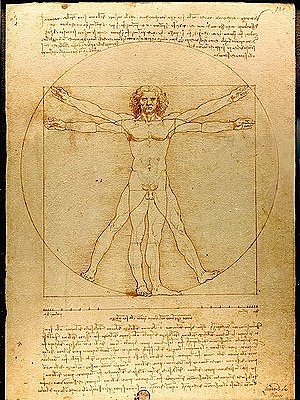
'The proportions of the human body according to Vitruvius', Leonardo da Vinci, about 1490.
" … a Muddle Ages, arguing over theology."
Our Damned Pandemic seems to have sparked a spike in circular reasoning, that form of thinking Bertram Russel once compared to larceny. We've been swiping answers we want, probably because we so want them to be true, for the nightmare to conclude, that we suddenly find ourselves capable of justifying anything and calling that conclusion perfectly reasonable. Circular solutions seem to prove their premise. Because of This, That AND because of That, This, deduction be damned. An induced solution seems to resolve the troubling problem. Hydroxychloroquine certainly seems to cure this 'flu,' except it isn't a flu and supporting evidence seems rather thin. An act of faith or firm believe gets involved and seems to securely seal the underlying logic. Hopefulness gets the better of us, inviting in a following fresh bout of despair. The meta-cycles of hopefulness and despair seem likewise circular, and we spend some days feeling as if we were circling around a huge drain.
We set our expectations innocently, stating our objective clearly. No harm and no foul.
Sorrying
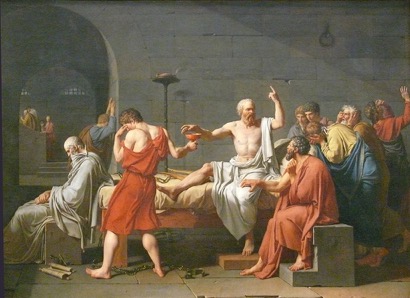
Jacques Louis David, The Death of Socrates, 1787
" … no identity changing required."
The GrandOtter said, "Sorry."
"Sorry about what?" The Muse replied. "Sorry about saying you were sorry?"
I imagined an infinite spiral starting with an innocent sorry then circling ever further downward, one sorry inexorably spawning another, ad infinitum. Of course, The GrandOtter meant that she was sorry, though she sometimes prefers a more present tense and says that she 'is' sorry, after which I imagine I'm witnessing sorry incarnate. I thought I was sorry, though I more probably never was anything of the kind. Perhaps I felt sorry, which might prove to be as far from being sorry as anything could possibly be. No feeling defines anyone, for feelings come as information, not definition. One most certainly feels sorry without actually embodying that sorry state. I think we mostly forget this fact and whack ourselves with an ill-advised identity, when we were simply feeling sorry.
Sorry seems a sorry excuse and a worse apology.
LongHaul
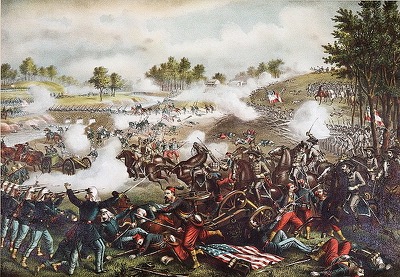
First Battle of Bull Run, chromolithograph by Kurz & Allison, 1889
"Heads you win, tails we lose."
Both Union and Confederate soldiers expected the first skirmish of the Civil War to decide the conflict's final outcome. Fine ladies in carriages accompanied troops to the battlefield, expecting a diverting exposition, an amusing afternoon's competition. The Army of the Potomac outnumbered the rebel forces, which were hardly an organized army by then, but were filled with fervor. Neither side imagined the possibility that they might lose. The Union crawled chastised back to Washington that evening, and thus began a long ordeal during which the futility of the rebellion never seemed to settle in. Each side won some and lost some, but each side's dedication rarely wavered. The Confederacy quickly became a brutal autocracy, starving itself in ever-deepening delusion that their dedication might ultimately count for something. They touted Lee as the superior strategist, though he managed to lose every significant conflict. He'd won at Bull Run then went on to narrowly retreat from Antietam and Gettysburg. The terms of engagement seemed to have been set on that midsummer day in Northern Virginia. The manner of engagement largely remained intact throughout.
Both British and German troops cheered their way to the Marne in 1914, thinking themselves on an organized holiday.
InvisibleHandiwork

Adam Smith, Our Invisible Friend
"May we each come to more deeply appreciate our own agency."
The clever critic starts every review with some variant of, "Far be it from me to criticize, but …". That's a really BIG but, ingenuous as Hell, so I will allow myself to start this criticism more authentically. Your Invisible Friend continues betraying you. Your continuing faith in his underlying beneficence crosses the line between devotion and idolatry. Believe whatever you choose to believe, I say, but consider what each belief bestows upon thee. (I'm very likely to get preachy from here on, so proceed with care.) Any belief that continuously punishes your faith in it, ain't that great of a belief. Any faith that feeds cynicism should simply be abandoned. Any devotion that breeds a deepening sense of victimization, does damage rather than good. I know I'm not supposed to propose any hard shoulds, but please consider what your experience could become if you ditched your insidious Invisible Friend.
He has, they say, an invisible hand, one which, without human intervention, rules economic progress.
PursuingHappiness
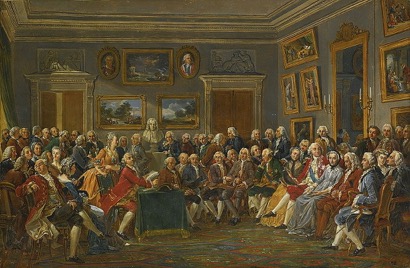
Reading of Voltaire's tragedy of the Orphan of China in the salon of Marie Thérèse Rodet Geoffrin, by Lemonnier. Circa 1812
"Could anyone find full satisfaction with that?"
The Age of Enlightenment eventually brought many improvements. Previous unspeakables became openly discussed. Rights of individuals came to be held as more sacred than the formerly presumed divine rights of either monarch or church, but at best I might fairly characterize that age as a lurch forward, for none of the resulting improvements came about easily. A couple centuries of brutal warfare has left us still divided, for both liberalism and its dedicated opposition emerged from those discussions, and the arguments continue perhaps in even greater earnest. Like all great movements, The Enlightenment was never advanced by particularly enlightened individuals. Assertions were made with little supporting evidence. Convictions encouraged every variety of pseudo certainty: prejudice, bigotry, misogyny, and racism thrived within The Enlightenment and, indeed, seem to continue thriving today, for The Movement could never produce the sorts of confident certainty divine rights might have bestowed. It represented a second order paradigm shift, trading extreme faith for continuing speculation and experimentation capable of approaching improvement but only by iterating, recognizing and adapting to error. All this performed by mere humans. It was and is quite the continuing speculation that it might succeed, and yet it did and has, though also didn't and has not. The path to anywhere from there seemed paved with the scientist's patient wariness, but few followers qualified as scientists.
We seem an impatient lot. We want what we want when we want it, not later, and enlightenment demands patience above all.
Publickity

Entry of John II of France and Joan I of Auvergne into Paris after their coronation at Reims in 1350,
later manuscript illumination by Jean Fouquet
"Notice how I'm not promising a glowing experience or to potentially change your life …"
Today's the day! I find myself suddenly NowHere after a couple of years' preparation, ready to more publicly display my creation in an act of Publickity, by which I mean not an act of publicity intended to gin up notoriety, but a slightly broader sharing. Few have seen my most recent works, though I have more than a dozen in various stages of final completion. A book goes through many completions, an initial one followed by several subsequent ones, each accompanied by its own sense of doneness, all but the final one ultimately false but nonetheless rewarding. There's always one more pass needed: editing, sequencing, re-editing, fine-tuning, the list extends well into a small infinity. Even the final, final, final, final version carries considerable uncertainty, it still being unproven in broader contexts.
I've combined the pieces I individually posted two summers ago under the hashtag #CluelessSummer into a book-length form sporting a new title, Cluelessness.
SelfExamination

The Ouroboros and the Tree of Life, Ancient woodcut
" … consider cluelessness to be the absolutely necessary precursor to learning …"
I don't think of myself as a snake and I most certainly do not possess a tail, but SelfExamination tends to leave me feeling like a snake who's eating his own tail, Ouroboros. I finished re-re-reviewing a manuscript this morning—those repeat offender readers might remember it as my CluelessSummer project from two summers ago—and I finished reading the danged thing feeling like Ouroboros again. The manuscript seemed to end just where it had begun, having resolved nothing, not really, the initiating mystery preserved through ninety or so reflections upon it. The ancients believed life worked like this, featuring unresolving cycles destined to endlessly repeat, inquiry not definitively resolving, but perhaps only animating the universal fate. Progress, or the certain notion of it, separates us from the Ancients, for we believe in the eternal possibility of progress. We want to have arrived somewhere by the end of it, for resolution to have become the reward for paying the price of admission and the cost of subsuming attention toward the performance. We genuinely believe that we're owed release by the end, that we'll come to know that the butler did it (again).
But I don't write like that. I couldn't come to a conclusion if kidnapped, tied up, and ditched at the intersection of Over and Donewith.
Detention

Departure of the Joads, Thomas Hart Benton,1939
"Detention offers opportunities to more deeply appreciate …"
The cats Max and Molly "accidentally" escaped again last evening as I was finishing up the grilling. Fact was that I felt in need of escaping, too, accidentally or otherwise, for my heart felt like it was no longer home here. Oh, I hold the old place dear enough, but I'd had more than enough and needed something different in my diet. The lamb and veg kabobs were nicely finishing, and those two baby eggplant featured perfect grill marks, but I'd seemingly lost my appetite for home and hearth, which had by then accumulated a half-summer's worth of shirked maintenance. I'd accumulated a seemingly insurmountable backlog of everyday ordinary activities, somehow supplanted by even more mundane things. I felt out of place at home and caught myself aching to escape, so I staged a Great Escape for the cats, who seemed doldrum-ish and anxious to roam, too. I had grilling to do and The Muse was almost through making an emergency batch of homemade Tzatziki. The cats hadn't immediately disappeared, seeming to complain about the wet deck surface an earlier rain had left behind. Not even liberation produced the exuberance I expected from them. We all felt as though we were still in Detention.
Max was waiting when I opened the slider just after three this morning, and Molly appeared an hour or so later.
Visitations
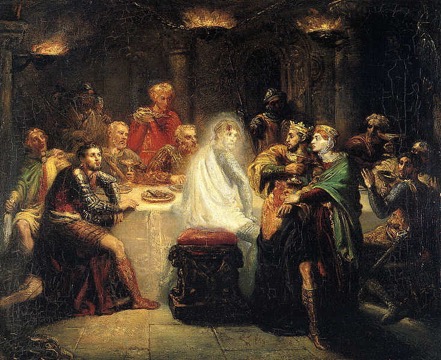
Théodore Chassériau, The Ghost of Banquo, 1855
" … what these Visitations seem to do to me. "
It seems to me that my departed friends never leave me for long. Once gone, they revisit, often at inconvenient times, apparently intent upon setting me onto a somewhat straighter path, for I meander on my way to pretty much everywhere. The shortest route between any two points seems utterly irrelevant to me, as I seem to insist upon usually taking some more scenic route. I set a goal then head off in another direction, my dereliction ranging behind me, weighing me down. These diversions even seem necessary, for if synchronicity is to have any chance of influencing me, it seems I must stray from any straight or narrow. My detours sometimes seem down right harrowing, for I often get lost in those woods. I seem to sometimes even abandon myself when straying, as if my underlying purpose in pursuing might have always been betraying myself. I end up lost, good and lost though it often feels bad and betrayed, as though I've cost myself my dream.
My departed friends tend to visit me then, when I'm feeling pretty near to absolutely dead-ended.
Experteasing

Left panel of the Dreux Budé triptych: the betrayal and arrest of Christ,
with the donors Dreux Budé and his son Jean presented by Saint Christopher by Master of Dreux Budé (circa 1450)
" … a place where few will ever suspect you of the sin of full expertise."
When I call for a refrigerator repair, I hope an expert (but not too much of an expert) will show up. I prefer working with an upwardly mobile journeyman rather than a full master. The full master's likely to be dismissive and perhaps denigrate me for abusing the appliance while the journeyman will still be inquisitive and learning, and more likely personable. Masters tend to be grumpy and filled with apparently irrelevant details, which they're anxious to share. I won't really want to learn the complete history of refrigeration, just enough information to get my machine working again. I'm even satisfied if the journeyman has to call back to the office for additional information. The expert who can complete the repair with his eyes closed scares me.
The problem with the experts in any field might be that they tend to scare the people with whom they interact.
ReOpeningUp
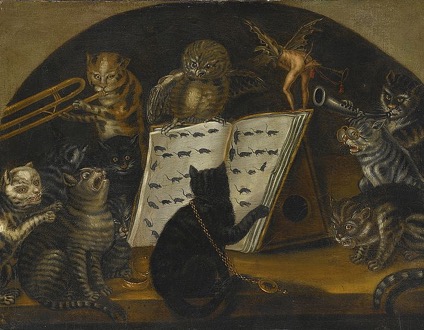
According to Sotheby's: Cats being instructed In the art of mouse-catching by an owl
Looks more like: A cat orchestra/choir directed by an owl, with sheet music made of little drawings of mice
Oil on canvas, circa 1700
"Yea, we can hear you now."
Each conflict seems to encounter its Midway Moment, an event that, while not fully resolving anything then, clearly presages an eventual outcome. I believe that this late July week just might have provided this cue. Though we're far from through with This Damned Pandemic, we seem to finally be taking it as seriously as it had been taking us for months and months. I see clear signs that we're no longer hawking bleach or hydroxychloroquine, and even Floridians and Texans seem humbled as their ICU beds fill to overflowing. Pandemics famously continue until. Until what is never obvious, but Damned Pandemics can be damned insistent, heartlessly continuing until we somehow catch on. Then we're playing catch-up for a long while. Few seem willing early on to trust mere knowledge or experience, and most want to rely upon their instincts, which have not yet evolved to fully understand the previously unexperienced challenge. We initially reject historical analogies as preposterous. We learn, painfully slowly, then we begin engineering a reckoning, a ReOpeningUp. Something seems to need to change within us before the changes we strive to engineer around us can come to anything but naught. This was the week that prefaced something different coming.
Extremism in pursuit of anything inevitably produces the opposite of its intention.
Backlisting

"Salvation visits, and the heavens open in blissful chorus …"
Back in the earlier days of this Damned Pandemic, shoppers became familiar with terms like Fragile Supply Chain, a concept every bit as interesting as Capital Asset Pricing Model or Unsecured Credit Default Swap, stuff the average Jane or Joe never found reason to care about until the National Toilet Paper Stockpile turned up empty seemingly overnight. We had come to think of toilet paper as an almost God-given right, by which I mean it had become the ultimate free good, given gratis in public restrooms everywhere without ever a thought to where it might come from. It turned out that there was a whole industry behind its production and distribution, that fairies hadn't just left the stuff within eternally easy reach. Shortages were possible, and we had no idea how we might ration the stuff. Many had never fully appreciated that the lowly toilet roll might have been a tacit centerpoint of their professional compensation package, for the employee "lounge" had never once attempted to charge for or ration the stuff, though rumor had it that the executive floor stocked a fluffier quality than did the John off the loading dock. Anyway, us consumers were shocked when we found empty shelves dominating the old TP aisle. Shortages quickly spread to the paper towel shelves, too, and we formerly privileged many were rudely introduced to the sort of austerity that hit us square in the shorts. Ouch!
Some shifted to online shopping, prompting an armada of brand new Amazon vans with their weird smiley face logo to begin rushing family-sized containers of this freshly precious stuff to every corner of the country.
LongDistance

" … a history where LongDistance briefly grew ever shorter before smartly snapping back closer to its traditional borders."
Geezers have always loved to tell stories about The Old Days, by which I mean the days when this world still seemed young to them. The later days, these days where geezers experience their ever advancing age, seem downright ancient in comparison, for they feature patterns grown far too familiar to frequently surprise or even delight, while back then, every new morning brought promise and discovery. Every generation believes that this world was produced for their delight and personal enlightenment. I remember doubting the existence of history then. How could history have been if I had not been included in it? I considered everything chronicled as having occurred before I was born to be a rumor, fiction created to cover up an obvious truth, that there could not possibly be a world without me being in it. Of course life eventually beat that notion out of me, once I'd started accumulating my own history for which many had not been present to witness. Aging eventually cures self-centeredness.
Horizons seemed to have broadened since then.
ChickenShit
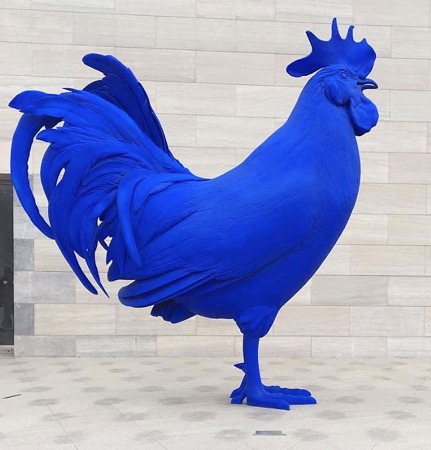
Katharina Fritsch, Hahn/Cock, 2013
"I cannot quite imagine a payoff or penalty worth the risk just yet."
Much of what tries to pass as information emanating from the current administration (which cannot seem to properly administer anything) bounces right off me. I can't care about crowd sizes or Our President's glowing self-assessments. I know they're all lies, and I'm not surprised or deeply troubled by them. He's a troubled man publicly wrestling with himself and largely losing. It's not really a fair fight. I mostly pity the poor guy, who by many accounts, never believed that he'd ever be elected into office and never really took to The White House. I understand that he'd really rather be golfing, a man his age, accustomed to big swindles and dedicated to never working very hard. He's arm candy gone stale and bitter, no longer really fit for public observation yet addicted to the stage. He seems to live in a dismissive rage now that he's the most powerful man in the world, or was before he started shedding power in favor of force which, of course, reliably backfired on him. Then he took to lying about our Damned Pandemic, obviously not even trying for a shred of truth, and I noticed that I noticed this and watched myself turn all ChickenShit.
ChickenShit's a Junior High word describing anyone unwilling to accept an unreasonable challenge.
AnEcologyOfUnknowability
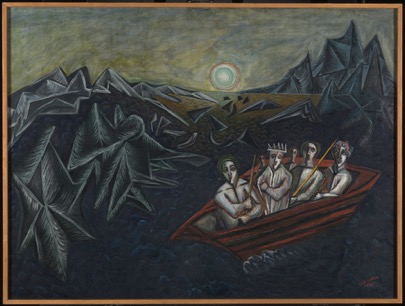
Cecil Collins, The Quest, 1938
"Our limitations denote the depth of our wisdom, not the breadth of our stupidity."
The unknowable seems to bedevil me. I do okay with the Known Knows, the Known Unknowns, and even with the Unknown Unknowns, for each of these categories still contain a presumption of potential knowability. My demons inhabit an orthogonal space which I cannot quite place on any known continuum, those defined by their tenacious unknowability. My ability to know serves no purpose there, for I could not possibly compare Unknowability's content to anything known or even anything distantly suspected, otherwise it might slip into some ultimately knowable classification. Some questions are nothing more than questions, posed, perhaps, not for answering resolution but to simply endlessly resonate. Who or what created the universe and when? What will next Tuesday bring? How many angels could actually dance on the head of this-here pin? We cannot even begin to know.
I can certainly pare down some mysteries, carve along margins to come to know a few details without ever actually addressing any fundamentally unknowable.
Gathering

The Ghent Altarpiece: The Adoration of the Mystic Lamb (interior view), painted 1432 by van Eyck
"They're well worth the occasional, exceptional, judicious risk …"
I reflected as we drove the narrow twisty road down into Boulder that I had not attended a Gathering of any sort in five full months. Focused upon sheltering in place, justifying going anyplace had become a negotiation, with just staying home usually winning the debate. Out, we became Covid invisible, proximity monitors on full alert, averted gazes taking the place of all human contact. We could move through as much of a crowd as an entry-controlled grocery store could offer without making a ripple, hardly noticing our own presence there before heading back to our altogether too familiar car which would as equally invisibly carry us back home and into isolation. But The Muse's first cousin's daughter Grace was holding a graduation recital up at their Boulder place, strict masking in place and to be held outdoors. The Muse's aunt would be there and the promise of a little family time drew us. I did not feel nearly as concerned as I expected to feel.
This was a genuine shindig attracting a crowd of perhaps sixty seated in lawn chairs across the broad front yard.
ConSpiriting
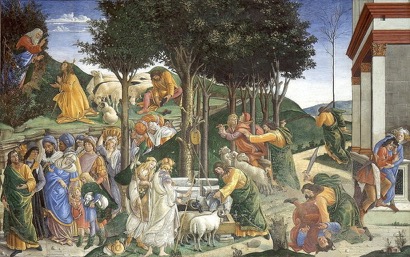
Youth of Moses, Alessandro di Mariano di Vanni Filipepi, known as Sandro Botticelli, circa 1481
" … some days, I even suspect myself."
Those in the know come to understand that everything's a conspiracy, and this might well be true. I gratefully live out of the know, largely unconnected, absent that conspiracy-minded spirit. I see ample evidence of a vast right wing conspiracy rooted way back in the Confederacy and dedicated to utterly undermining any threat of representative democracy encroaching on their autocracy. Most of us were certified under some form of neoliberal indoctrination, with "friendly" corporations funding special programs, even whole departments, at our so-called public universities. We come to hate commies, love Jesus, despise taxes, own guns, and distrust our own government. We weren't born wanting any of that. A conspiracy was probably behind it, but so what? So what?
ConSpiriting, that hounding sense that some deep dark conspiracy's actually behind most everything, cannot be disproven.
WarFooting
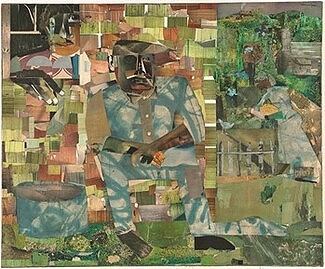
Romare Bearden: Tomorrow I May Be Far Away, 1967
"Lead us, please, into temptation and deliver us into the open arms of genuine evil, for we've come to revel in our supreme sense of invulnerability, for we are free! Free …"
Our enemies show us who we are, who we become when under extreme duress. Our friends reinforce for us who we intend to be, but our enemies goad us into showing who we're capable of being when we stop trying to please. We never placate or reassure our actual enemies, but seem to seek opportunities to highlight just how evil they must certainly be underneath. We give no quarter, we take no prisoners unless forced to, and then, only begrudgingly. We have demonstrated our willingness to bankrupt ourselves when we're on a WarFooting. Nothing's too expensive then, we'll mortgage the farm and the truck and the cow without hardly considering how we might one day repay the debt. When it's war, we conscript our sons, willingly wager our futures, and forget what we learned in the past. Nothing seems too dear and we inure ourselves to committing unspeakable acts for righteousness' sake. We conscript God and all religions to sanctify our necessary insanity. We are gratefully rarely publicly warring, for we've grown to understand that we can hide what's going on in those distant war zones by keeping the press out and lying to the public about what those invisible tussles might really be about. We have no stomach for war or for the truths it discloses to us about ourselves.
I can tell that we are not on a WarFooting where our Damned Pandemic's concerned.
Healing

Mediaeval tapestry illustrating bloodletting.
" … I'm satisfied with Healing from my latest attempt to heal myself."
I woke up this morning with a clear head for the first time in six months. The outset of the malady had somehow escaped my notice, for I was at that time filled with fresh promise. My Nurse-Practitioner had prescribed a fresh medication intended to counteract my high triglycerides level, a condition I inherited from my father and share with all my siblings. I had tried—honest, I'd tried—back during the cholesterol scare of the eighties, to find some way to combat this anomaly, but had surrendered when the prescribed medication was recalled as more dangerous than the impending disease. I'd taken to observing by far my favorite treatment, radical acceptance of the way things just seem to insist upon being. I figured, and probably not wrongly, that the state of the Healing arts had not then progressed to successfully treat what my father had only managed to unsuccessfully try to treat for the last half of his nearly eighty-five years. I'd concluded that my triglycerides were a feature and unlikely to encumber my life.
But my brother had told me about a prescription he'd started taking and my sisters chimed in that they'd begun this treatment, too, with promising results, so, though I was hardly convinced it would address my instance, I agreed to at least try it and see. I tried it and saw.
JustPracticing

Theodoor Rombouts: Allegory of the Five Senses, first half of the 17th Century.
"You're not actually going anywhere, anyway, JustPracticing."
When physicians ply their trade we say they're Practicing medicine. When surgeons work, we claim that they're performing. Since all surgeons are simultaneously physicians, are they Practicing when they perform? Our terms for engagement might misrepresent the nature of engagement. Are truck drivers performing a service or practicing a skill in which they've yet to achieve full proficiency? I might expect flawless service from a performing practitioner but accept a few flaws from a Practicing one. The very term practitioner suggests someone practicing, the skilled practitioner supposedly the more experienced at Practicing rather than performing. Practicing, as anyone stuck with a clarinet in 4th grade understands, does not necessarily translate into immediate or even eventual perfection. One might become much more skilled at Practicing than they ever become at performing, as every garage band member can attest. And it might well be that every performance serves as a simple extension of Practicing, albeit in some different context. Singing in the shower might prepare someone to perform on a stage, but the situations hardly compare.
Practicing seems necessary but not predictive.
Memento Mori
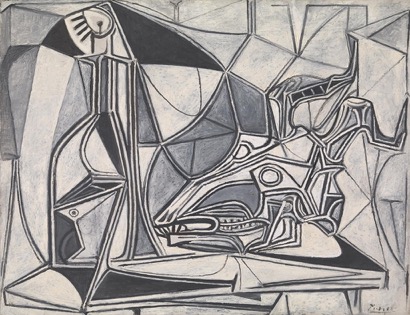
Pablo Picasso, Goat’s Skull, Bottle and Candle, 1952
Memento mori: an artwork designed to remind the viewer of their mortality and of the shortness and fragility of human life.
"Plagues only seem interminable. Life remains short."
Not to wax too finely over the obvious, but The Damned Pandemic strikes me as an enormous Memento Mori. It hovers as an annoyingly continuous reminder of the proximity of morbidity, mortality, and tragedy. Threat hovering over an Eat, Drink, and Be Merry Culture so recently dedicated to ignoring these inescapable elements of existence. Excuse us, please, if we all of a sudden seem unusually pissy. I've noticed myself complaining more but curiously enjoying it much less. I never became an actual habitual complainer, thinking the practice generally unseemly, but I readily admit to finding some welcome solace in the practice, if only occasionally. My complaints seem to work like a capacitor, slowly building a charge before releasing it in a quick discharge, seemingly coming from absolutely nowhere. I'm a smoldering, slow-burn sort of guy, rarely belying my steady countenance until already over some edge. Curiously, I usually feel much better after an outburst, as if most of the cure for my complaint came from simply airing it. An ounce of finding somebody to whine to might be worth a pound of any other cure.
Now, we only have each other to whine to and we each suffer from precisely the same complaint.
'Stitions
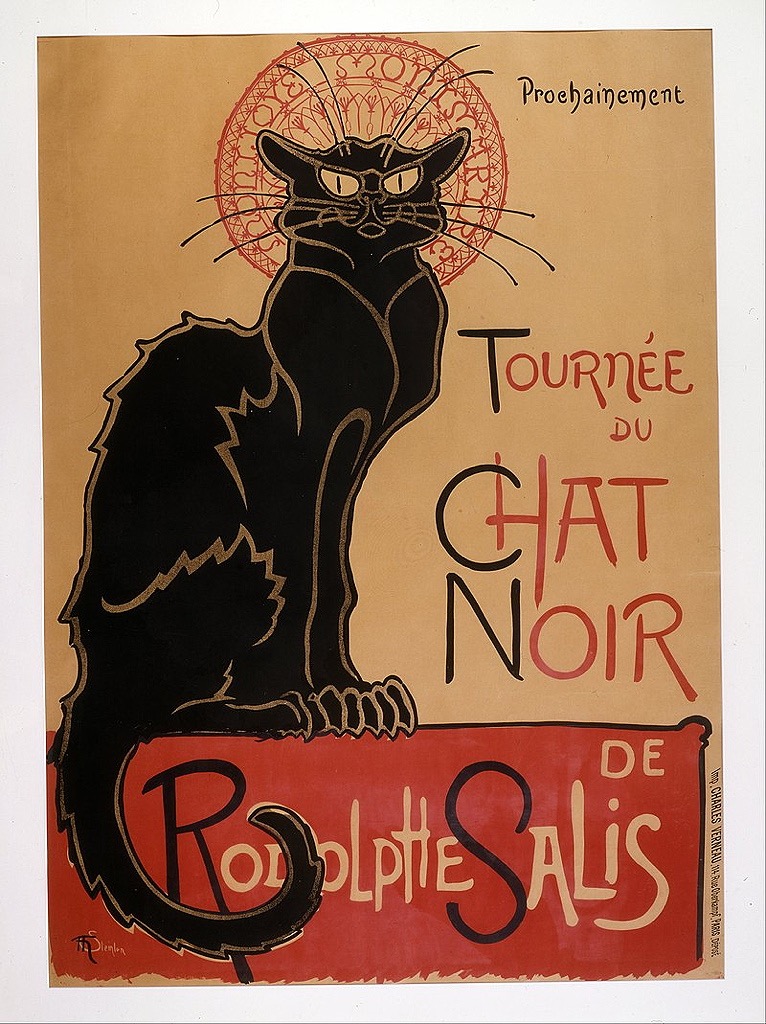
Théophile Steinlen's 1896 poster advertising a tour to other cities ("coming soon") of Le Chat Noir's troupe of cabaret entertainers
"Evil might even appreciate my diligence whenever I remember to keep it at bay."
I consider myself minor-stitious rather than superstitious. This designation means that I maintain more awareness than belief. I certainly do notice when a black cat crosses my path, remain scrupulous about not walking beneath open ladders, and appreciate parking karma when it visits me, but I do not go into hiding at the drop of a black cat, open ladder, or when forced to park a quarter mile away from my destination. I believe it healthy for a modern such as myself to retain a taste for lore from the past, not to the point of foraging for newt eyes or keeping a caldron simmering, but to show respect for my ancient elders. I feel confident believing that a few of my direct ancestors believed in witches, for they were Puritans, and Puritans believed such things. I feel confident that a few of my more firmly held beliefs will have been shown up as mere superstitions four hundred years hence, for that's just something futures seem destined to do to our practices, particularly the more sacred ones. I acknowledge my primitive sides, even though they might presently mostly hide from my sight.
Many of my 'stitions stem from my relationship with synchronicity, that sometimes sense that destiny's discovered me by means of the apparently happy accident.
Slipstems
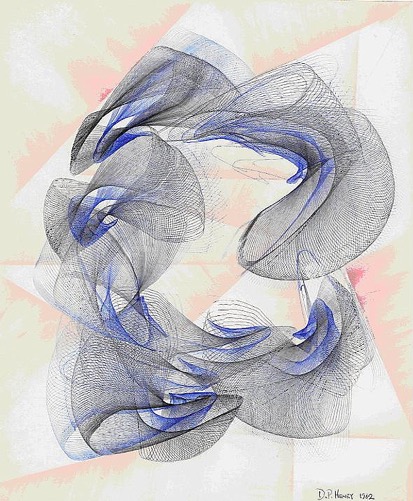
Picture by Drawing Machine 1, c. 1960
"I type with one hesitant finger regardless of the keypad."
We now possess what we firmly believe to be a well-developed understanding of systems. It's systems this and systems that, everything spoken of in systemic terms. I, myself, sometimes seem little more than a minor node within some vast collection of interrelated nodes, probably contributing some essential element to achieving some unknowable. We have ample systems where the leg bone's quite obviously connected to the hip bone, and innumerable essentially unconceivable systems where mysterious viruses invade in mysterious ways. We do not seem to have a well-developed theory of unconceivable systems, though, other than to complain about so-and-so seeming to not be much of a systems thinker, and I think we suffer under this absence. I refer to these mysterious systems as Slipstems, for their subtleties seem to slip right by us. We perceive them as materially different from what they might actually be, and behave accordingly, coping poorly with the resulting feedback.
I think of systems as unforgiving monsters tamed only by understanding.
Feckonomics
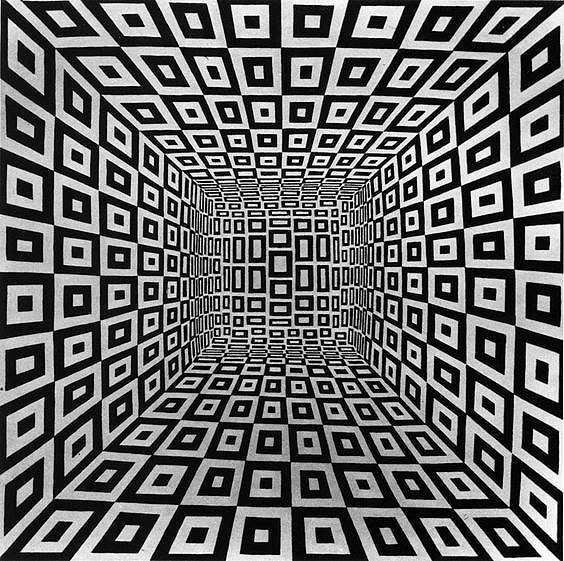
Richard Anuszkiewicz, Knowledge and Disappearance, 1961
"Human agency becomes evidence of absent fealty and simple want, a grave moral shortcoming."
Economics seems the most feckless profession, one largely populated with avowed blind men endlessly arguing over the nature of an imaginary elephant before them. Each wears the spectacles acquired through their religious conversion into one school or another, the sorts of schools more focused upon indoctrination than studied observation. One might claim to be of the Austrian School, an aristocratic pedigree, indeed. Another might have sworn fealty to Keynes, a mighty systems thinker who never actually settled into any particular insistence. The Behaviorists have become increasingly popular, though they fancy themselves as insurgents not aspiring to prominence within the profession. Supply-siders, rarer than exotic hen's teeth following their 2008 financial system debacle, executed a come back on the backs of whacky, self-espousing conservative Christian law breakers, only to systematically organize another feckless pilfering of the public purse for parochial allocation. It seems that only the depth and color of conviction separates these schools, each in turn becoming the favored idiot step-child of some ignorant administration.
However wise and well-informed any individual economist might have proven him/herself to be, their philosophy only ever finds utility when associated with some administration's policies, and those policies are largely framed by folks with much less understanding and perhaps even greater religious conviction than any individual practitioner.
Bitchuals

Priests of Anubis, perform the opening of the mouth ritual; illustration from the Book of the Dead of Hunefer
"I have no idea who I'd be without them hectoring me."
I tell myself that I maintain my many rituals to retain my sanity, but truth told, they occasionally drive me crazy. I maintain many rituals, for I seem to be one of those beings more attuned to rhythms than melodies or rhymes. I hold an extreme sensitivity to timing, and sense in what sequences I should engage. I meditate before breakfast, never after, and insist upon fasting until after I've finished my morning writing. My doctor prescribed a pill I'm supposed to swallow a half-hour before breakfast, which disrupts my usual sequence of rituals, delaying breakfast until seemingly much later, so I can throw in my morning shaving and showering ritual before I eat. I fairly religiously maintain these little engagements, inevitably in precisely the same sequence, until long after I hear myself starting to complain about them. They sometimes seem more habitual than actual ritual, only occasionally inducing any increased mindfulness. I confess to complaining about them to myself, as if I'd been cursed with them rather than them having once been freely chosen. I might best explain them as Bitchuals now, rituals where the underlying incantation has become subvocalized complaint. I bitch to myself about 'having' to perform them.
I wouldn't trade my Bitchuals for the world and most of its charms, for it seems I'll come to harm should I disrupt my sacredly profane routine.
Behinder
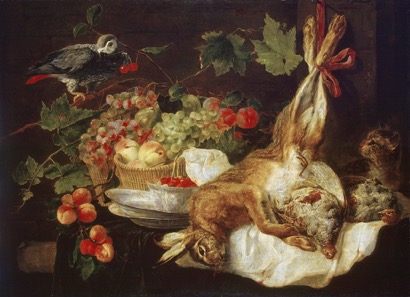
Hare, Fruit and Parrot, Jan Fyt (Fijt), Flanders, 1647
"The hurrier I go, the behinder I get." -Lewis Carroll
Our society behaves like a still life painting aspiring to become a Walt Disney movie. Directed to stand down, we commence to running around as if simply sitting still might kill us. We had formerly proven ourselves to be an impatient lot with hungry eyes, sprinting into our future, prone to act first and think later, if ever, so I should not feel in the least bit surprised at our latest antics. Certainly some seem fully capable of simply sitting with themselves, alone with their existence, but generations cultured as Mall Rats seem more than hesitant to abandon their once reliable ship. Days off were often seen as excuses to get out and do something, and any urge to stay at home, evidence of some underlying social malady. We became public beings without apparent private life, sharing what would have once been seen as personal secrets with loosely organized audiences composed of more or less equally imperfect strangers, bound by our compulsions.
How, the pundits wonder, did the You Ess of A become the centerpiece in this latest piece of performance art?
TheSphericalCow
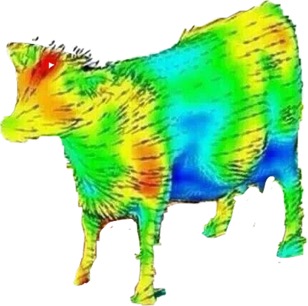
"The scientist trains to understand how to propose and then let go of naive initial assumptions."
Theoretical Physicists seem to forever resort to a mythical Spherical Cow when attempting to analyze some natural phenomenon. Let's say, for instance, that said physicist wanted to consider the aerodynamics of a cow. (This sort of problem rarely comes up for consideration in the careers of chartered accountants. This might be the best reason to avoid a career in chartered accountancy.) Rather than first include all the variations a cow's body shape might add to the initial calculation, the canny physicists will employ a bit of fiction and first assume a Perfectly Spherical Cow, an utter absurdity. Given this regular shape, general principles might be easily identified to produce a rough first draft of a solution. Later, our physicist can add complications like legs, horns, hooves, and head, to iteratively produce more real world assessments. First pass assessments frequently rely upon a mythical Spherical Cow.
Much science advances in a similar fashion, building upon some deliberate fiction when first attempting to understand some phenomena.
HeatWave

Die Kornernte (The Harvesters), Pieter Bruegel der Ältere (Peter Bruegel The Elder), 1565
"I cannot capture these dehydrated days for reconstitution later this year."
The petunias have finally come into their own, thirsty every other day. Those plants not yet convinced that it's actually summer probably won't amount to much this year. The deck fountain loses an inch to evaporation overnight and will need refilling by tomorrow. The yard crunches underfoot, though the grass still looks green. Everything dries from the bottom up, the soil losing moisture faster than does the foliage. I'm on watch, wary of another huge water bill, I become stingy and careful. The air feels so dry that I wake up unable to swallow, my throat desiccated overnight to the texture of dry rubber. The air feels lighter than air. A cloud tries to drop rain, but its moisture can't quite make it to the ground and leaves nothing but a smear along the far horizon. Deer graze through the neighbor's garden, pruning plants they usually avoid. I prefer a shady spot these mornings while the world awakens to face a HeatWave.
By what magic has that winter become summer? I missed the transition.
ParodyProductions
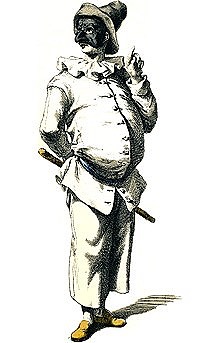
Book illustration of Pulcinella in 1700 (1860) by Maurice Sand
" … we're each seemingly blessed with this bottomless ability …"
My first enlightenment came with a frightening realization. I really felt as though I had been successfully passing for what I deeply felt I simply had to be. I caught myself behaving as the self I'd convinced myself I simply had to be, and I, in that moment, saw right through my flimsy facade. I felt in that humbling moment, deeply ashamed at how I'd managed to game myself into that condition. I felt deep contrition, but had yet to understand who else I might pass myself off as being. I had known almost forever that nobody would ever accept the me I once knew to be most representative of myself, that I could publicly be anyone else, but never myself, one Hell of a deeply false premise. And so had begun my first and probably greatest ParodyProduction of my life. I've been living down that performance ever since.
A parody begins with a slightly twisted premise and over time tends to turn into a really bad episode of The I Love Lucy Show.
SelfDeflection
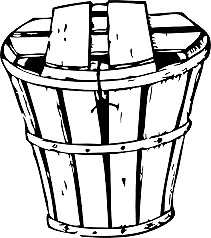
"Maybe we can't afford to know any different …"
In this neighborhood, almost everyone comes and goes through their garage door. As a car approaches home, the door opens via remote control, the car enters, and the inhabitant exits their car inside as the garage door slides back closed. This pattern limits opportunities for interacting with neighbors. Indeed, it limits one's ability to ever even meet a neighbor. We live adjacent but largely anonymously. I see the joggers and dog walkers without usually knowing which garage door they live behind. Once buttoned up at home, most people live looking out the back of their houses, where the hillsides provides views. The front yards, dominated by the driveway, might receive little but modest attention and even less traffic. Further, covenants limit the range of potential individuation allowed by each homeowner. Colors must conform to a narrow palate and even plantings, to consistent guidelines. I just this week, while out looking at the twilit sky, met a neighbor who lives just five doors up the street. She'd been living there since long before The Muse and I moved in five years ago. We'd never seen or met each other before.
This lifestyle seems like a form of SelfDeflection to me.
InterdependenceDay
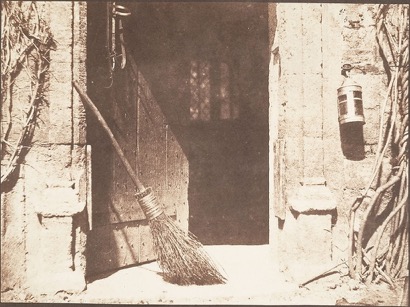
William Henry Fox Talbot, The Open Door, before May 1844
"Living free means living interdependently …"
Our kittens Max and Molly behave as if they'd rather I maintained an open door policy, for they feign fierce independence. They're apt to slip by me when I'm carting supper out onto the deck, though I'm more likely to accidently-on-purpose let them slip by me. They gleefully head for the stairway down to the backyard, where they munch long grass fronds —to later barf back up with their supper, which I will dutifully clean up without complaint—, cultivate garden beds, and roll around in the dirt before stealthily stalking birds they could not possibly catch. An hour or less later, and their independent spirit lags. Molly lies near the top of the stairs staring off into the distance while Max maintains his resistance, perhaps by climbing a tree. A shake of the kitty treats package brings them both fleeing back into accustomed dependency, though they shortly start sniffing and mewling around the door again, hoping to regain their independence.
Sometimes, Molly will escape and stay away for a day or longer, but eventually she'll return, contrite, looking as if she might appreciate a square meal.
SelfReferencer
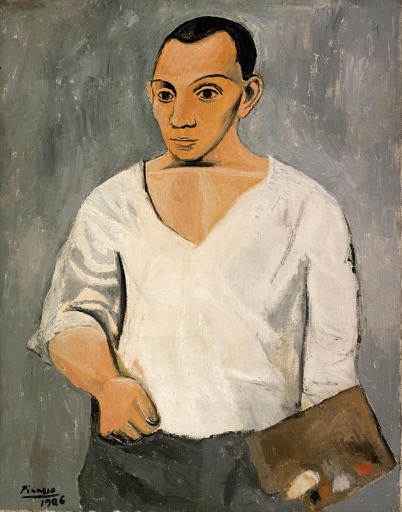
Pablo Picasso, Self-portrait with Palette, 1906
"I admit that I can usually see little further than my own nose …"
All literature seems inescapably self-referential, each work essentially self portraiture. That seems the sort of opening sentence certain to ward off all but the very most dedicated and/or delusional readers, for few want to experience another snake eating his own tail. Us readers want stories, and we're much less picky than we probably should be about where those stories come from or really what they're about. Stories can sooth readers into a supreme sense of self-control, elevating each into the role of almost omniscient observer and judge. After all, we're privy to what the protagonist thinks, his internal monologues, in ways we might not ever personally experience when observing ourselves. My internal dialogues only occasionally and perhaps accidentally distill into anything definite, and, as my dedicated Repeat Offender readers can attest, they often never reach any definitive conclusion. I roll around in my world like a wet dog on a recently clean carpet.
I have been over the past couple of weeks, working with my Genius Nephew to attempt to distill what I'm doing with my writing.
HardWork
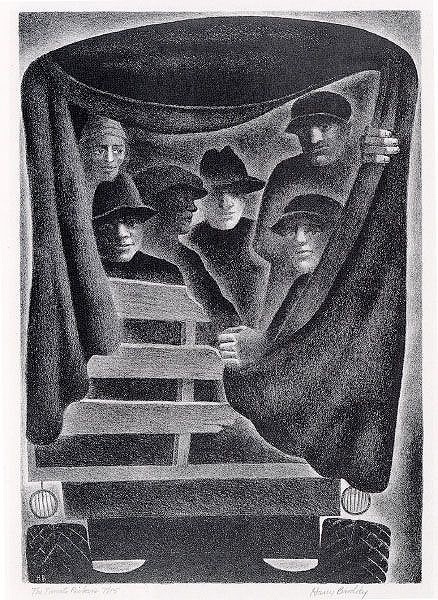
Harry Brodsky, Tomato Pickers, 1938
"It's always a fundamentally unfair fight …"
All insistences that we're a HardWorking people aside, I'd rather not have to work that hard. I'd feel a member of a minority if I didn't look around me. As my brother used to ask, "You working hard or hardly working?" My honest response would be that I was hardly working. I feel fortunate to have found so-called work that seems more calling than indenture, so even engaging long hours in it hardly feels much like working. I believe that even clever Yankees found ways to leave their Pilgrim forebears' HardWork behind, creating passive income streams to replace brow sweat and aching backs. Few seem to aspire to careers solely consisting of HardWork, but most might consent to a period of it in the firm belief that they'll eventually graduate to become one of those shiny-seated suits hardly working in the front office.
Still, some HardWork remains.
Educations
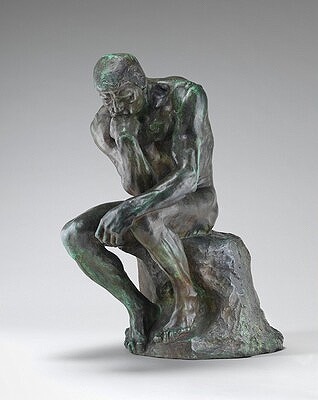
The Thinker (Le Penseur) by Auguste Rodin, model 1880, cast 1901
"It's pass/fail."
I learned more on my before and after school jobs than I ever learned in any classroom. I began as an intimidated student. Who wouldn't be, with the institution surrounding me? I later learned to become more enthusiastic, but I watched that enthusiasm leach out of me as I learned how the game was played. Even the well-meaning teachers expected me to memorize and test well, to diligently study (without once demonstrating what that entailed in a home with endless distractions), and to learn. I seemed more dedicated to preserving what I understood, defending that against threatening onslaughts ranging from math to science to foreign languages. I had no clear image of who I might become should I successfully assimilate all that orthogonal information, so I chose to hold onto what I had rather than abandon myself in favor of learning how to become anybody else. At work, I pretty quickly learned what I needed to do to thrive. School mostly taught me how to hide out until the serial assaults on my identity ceased.
The process of education deeply offended me.
TheGoldenBlurb

Narcissus by Caravaggio, 1597–1599
"Eviscerate freely, dear readers …"
My maternal grandfather seemed taciturn. He'd speak hesitantly except to poke fun, which usually seemed more mean than humorous. I knew that he'd seen a lot in his time, but he rarely mentioned his experiences beyond a few hunting stories, which I found generally uninteresting. I wondered after his manner of living, for his whole lifestyle seemed cloaked and therefore mysterious. I wonder now how he introduced himself to strangers and I realize that he never properly introduced himself to me. I remember him but admit that I did not now him well. He seemed of a different age. I'd seen the photograph of him as a barefoot school kid, with his Huck Finn-looking compatriots, back when he attended a one room school, where he'd stayed only long enough to graduate third grade. His census record lists him as a laborer, though he owned his own home on a small plot of land featuring a barn where he bedded enough livestock to service the household, chickens, a cow, and a lamb or two.
I began writing in earnest once I realized that I seemed destined for a similar fate, bequeathing little of my manner of living to my grandchildren, for I was certain the generational mystery would very likely ultimately nullify me.
MendingNets
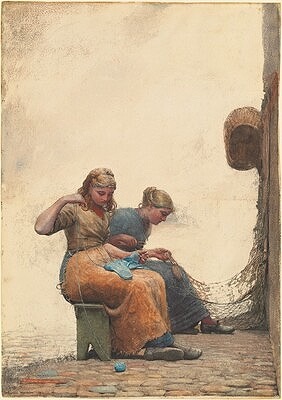
Winslow Homer, Mending the Nets, 1882
"When becalmed, mend nets."
I woke to the sound of my neighbor running a generator beneath his fifth wheel, a whale of a vehicle he surrounds with an annoying puce LED string when he parks on the street overnight. It provides just enough light to prevent anyone from plowing into it and just a tad to much for us up on the hill above to enjoy total darkness. Morning brings his predictable puttering, for he looks as though he and the missus will go camping this week, taking their whale up to some sprawling campground to, as they say, get away from it all. This morning brought a strange stillness, for the usual dawn winds failed to show up for work today. They usually get the conifer tops to tipping and whip around the aspen and cottonwoods, preventing any watering without wasting at least half of the precious water. This morning's dead calm, though, and it seems as though I'm missing a dimension. My usually animated world turned into a line drawing.
When becalmed, the fishing fleet would mend nets, for to idle away any day seemed tantamount to sin.
TheGooseberryMeditation

" … transcendent scratch scars which will hopefully never heal."
Gooseberries might be fairly characterized as a bear or a bitch of a berry, depending upon one's vocabulary. I consider them near the top of my long list of culinary delights, for I find them evocative beyond their own spare attributes. A hard, tart, unpromising fruit, they grow on thorny bushes which make them a bear or a you-know-what to pick, and once picked, they demand much from any devotee. Each tiny sphere comes with a stem and a blossom end, both of which must be trimmed to do anything at all with them. My mom used her fingernails, much as The Muse does to accomplish this end. I, possessing blunt fingers, employ kitchen shears to snip off each offending appendage. This effort makes painstaking seem downright cavalier, as each quart seems to take a year or longer to properly barber.
Convenience foods offer both much more and much less than simple convenience.
Shivility
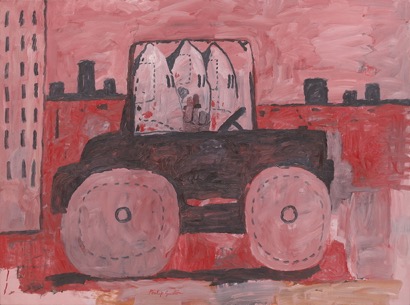
Philip Guston, City Limits, 1969
" … the one damned thing our Constitutional liberties do not provide."
Our melting pot seems to have become a caldron of complaints, our more perfect union defined more by its imperfections than by its inspiring aspirations, with innumerable factions, each presuming to speak for The People. Anything seems capable of sparking a fresh confrontation between passionate partisans and those they firmly believe represent some retrograde Dark Lord. Masks, strongly recommended by decent people dedicated to protecting public health, have somehow become tangled in notions of Constitutional liberty, as if protecting each other amounts to an unforgivable affront. The fabled Bill of Rights now seems the premise of an endless Bill of Wrongs enumerating endless infringements rather than encouraging civil consensus. Social Justice seems the new tyranny, as those harboring long-nurtured grudges forcefully demand a long-elusive equality, each advancement experienced as somebody's else's setback, producing a long, slow descent. Consent of the governed first requires some consent to govern by those to be governed, and no consensus seems likely to emerge. We've become an unruly herd, each seemingly dedicated to separate and inherently unequal interpretations of our common creed.
Civility cannot be insisted upon.
Accschleptance
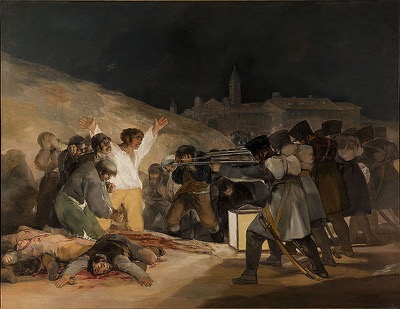
The Third of May by Francisco Goya, 1814
"the first great picture which can be called revolutionary in every sense of the word, in style, in subject, and in intention". Kenneth Clark
"The world changed. I haven't completely kept up."
Acceptance of the NowHere seems a first step, not a final one, for any fresh acceptance will likely appear clumsy, more of an Accschleptance than a flawless integration. This seems a cruel joke, for once surviving the denial, anger, and bargaining before achieving a point where acceptance might prove possible, the cycle seems to simply start all over again with acceptance. An exhausted acquiescence might best characterize the first taste of this sort of success, more surrender than embrace. However such changes occur, they're unlikely to show anyone performing at their best. You'll be several songs into the new set before the sound check's really completed, and until then, any early audience should properly feel initially disappointed. Later some mastery might emerge. Maybe.
This first week of Summer included the tail end of Spring, a transition for both seasons and my blogging themes.
EasingInto

"I dream of my own dominion while denying myself, as well."
I start my summer days slowly, waking early to waste the first few hours in a dark house gazing out into darkness. I wear a jacket, not wanting to waste an ounce of furnace fuel warming up space I'll later be desperate to cool. I step out onto the driveway to spy whatever satellite might be passing by and quietly curse the neighbor's paranoid night lights. They fear prowlers though their neighbors would just as soon somebody hauled their immobile vehicles somewhere far away where we wouldn't have to watch them rust all day and night. I suppose that I'm an annoyance to my neighbors, too, for I semi-scrupulously maintain my yard, which I do not consider to be hard work, just necessary, but in mountain communities, yards tend toward the natural, left as is, weedy and imprecise. We each display our vices, often proud of our attributes and unaware of the quiet rebukes our presence provokes. The Predawn slips like velvet across my face.
I feel master of this place in the wee, small hours.
Gruel
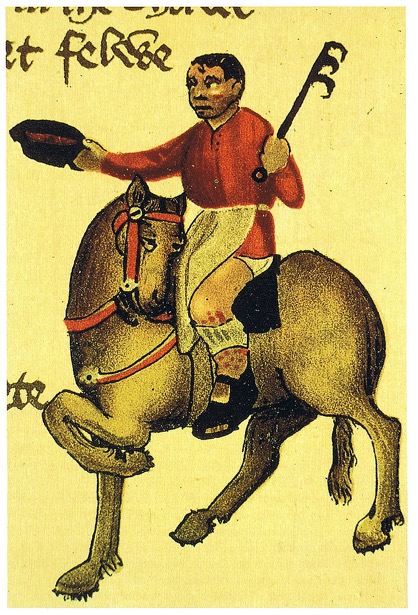
The disreputable cook from Geoffrey Chaucer's Canterbury Tales, the Ellesmere manuscripts, c. 1410.
" … fills me up without much fuss."
My earliest culinary successes came long before any literary success arrived, indeed, back when I was still essentially pre-literate. I'd read very few books by then and found reading tedious. I relied more upon my instincts then, rarely referring to any authority before undertaking a new activity. Cooking had long interested me, but my mother was no chef. My early influences included the Cub Scout Handbook, which illustrated how to boil water over a campfire. Once out on my own and poor, I learned through sad repetition how to make supper. A friend had gifted us with an enormous cylinder of a spongy protein powder athletes use when training, and I took to incorporating that stuff into darned near everything. Most of my meals amounted to naive inventions, eatable after a fashion, but rarely choice. The mysterious powder became the primary ingredient in what I called Giant Cookie Muffins, which resembled neither cookies nor muffins, but which carried more protein on board than the typical cattle boat. They were chewy to the point of spongy, and very, very curiously textured. You've probably never eaten anything even remotely like them. I also baked bread in empty coffee cans, having no proper bread pans, and I can confidently report that it always smelled like freshly baked bread, if not always tasting precisely like it.
I made many crude casseroles in those days, dishes which could serve as breakfast, lunch, or dinner, and often did.
Procrastidestination
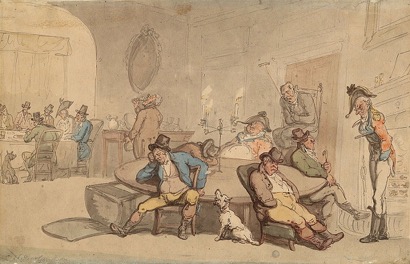
Scene In Club Lounge by Thomas Rowlandson, 1798
"A time will come, or not, …"
It seems to me that some days were not created to be seized. Procrastination has its rewards, not necessarily as a chronic form of engagement, but as an especially savory sort. I find wearying our long collective obsession with efficiency, for it seems to me that not every frog demands to be eaten at the beginning of every day. Some seem to beg for some contemplation, or even some strategic distraction, perhaps a clever tactical delay. Those observing might well diagnose procrastination as if that were a serious disease, and prescribe decisive action for relief, but I often find great relief in delaying an engagement, improving ultimate satisfaction that way. I seem to need to cogitate my way into some actions, for I sometimes waste my effort by simply jumping in before, for instance, determining the depth of a pond. Furthermore, few satisfactions seem to rise to the level I experience upon completion of a task I've long, or even overly-long, shirked. Plus, in those situations, I feel as though I've achieved on my terms, not the damned clock's.
Some of my forebears were strict Predestinationists.
Irrevocableution
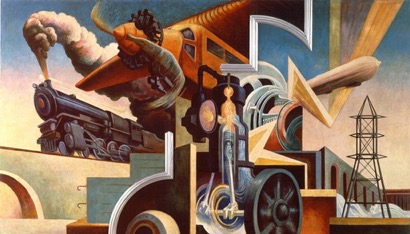
Instruments Of Power by Thomas Hart Benton, 1930-31, from his America Today Murals
" … while this fresh-faced image in this brand new mirror wonderingly gazed back at me."
Some say that biological evolution works only over large scales of time, but I do not believe this assertion, for my own biome seems to have been in continual transition since the day I was born. I might have been evolving daily, scaling this or that feature, never once static. I look for my reflection in my morning shaving mirror and often stare startled into that image peering back, for I cannot remember before seeing anyone precisely like that imposter staring back at me. The hair's at a different angle. The eyes slightly sunken. The nose somehow wrong. Sure, I always find at least a passing resemblance, but I'm increasingly moved to wonder why I even try to find myself there, or more precisely, why I try to find any self I might immediately recognize. I might better serve my self-esteem should I inquire rather than peer into mirrors, trying to see who I might be NowHere, rather than attempting to catch glimpses of whom I should already understand was already a past self. No man shaves the same face twice.
My old reliables either betrayed my faith in them or were never all that reliable in the first place.
NowHere
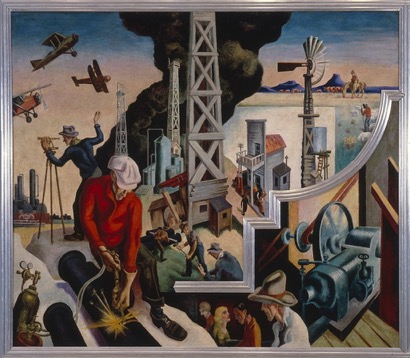
Changing West, one of ten America Today murals by Thomas Hart Benton, 1930-31
"Even if this Damned Pandemic never recedes …"
I went to bed last night in the there and then. Pandemics have a way of simultaneously propelling one both backward and forward. Backward into longing for how it once was and forward into hopefully pining after how it might become. Meanwhile, one remains steadfastly in the NowHere, a most curious terrain where, depending upon capitalization, it might seem indistinguishable from nowhere or a stunningly present NowHere. The longing and pining too easily become heart-bruising pushes and shoves since both objectives remain steadfastly out of reach regardless of effort expended. For short periods, longing and pining might produce some reassuring respite from any sudden, shocking trauma, but neither serves well as a lifestyle, and both in concert seem certain to result in a sort of skitzy-paranoia serving nobody well, a form of self-destructive denial. However far anyone might long or pine, they remain precisely NowHere.
When will this pandemic end? Likely not in our lifetimes.


